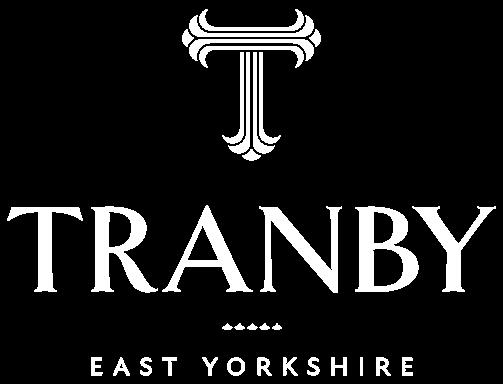VOICES OF HULL HIGH SCHOOL
AN ANTHOLOGY OF VERSE BY FORMER PUPILS 1939 - 1990 SELECTED AND WITH AN INTRODUCTION BY GORDON STEPHENSON







As a former pupil, parent and current teacher for over two decades at what is now ‘Tranby’ I have developed a deep fascination with Tranby Croft. This luxurious mansion was built in 1874-76 by Arthur Wilson, a wealthy local shipowner, with all the comforts of the time, and was intended to be a showcase property to help him and his future family make their mark and climb the social ladder in East Yorkshire.
I n its heyday, as the seat of this philanthropic and influential local family, it received politicians, British royalty, high ranking army officers, explorers and foreign dignitaries. However, the Wilson family also showed an early commitment to girls’ education in the area and it was Arthur Wilson who became the first and largest local shareholder of ‘Hull High School for Girls’ when it was founded in Albion Street in 1890 and subsequently moved to Park Street four years later.
F ollowing the death of Arthur in 1909, the fact that Mary favoured the London property or their villa in France and his children had all found their own destinies elsewhere meant that the house went into a period of decline, being opened up only for occasional charity events or other local functions. It was finally purchased by Alma Jordan in 1938 and rented out to the Ellerman’s Wilson line the following year before being offered up for sale again in 1943.
I ts future was quite uncertain and today we can look back to its purchase by the Church Schools Company with a sense of relief. It was in 1945 that the staff and pupils, having spent the preceding five years as evacuees in Milnthorpe, Cumbria, returned to East Yorkshire and started life, as a new family, in Arthur Wilson’s former home. I would like to think he would have approved.
I n my role as a teacher I am constantly seeking to identify, nurture and celebrate talent within my pupil community. As an amateur historian I am keen to collect, record and preserve historical records for future generations. In this publication both of my interests coincide as I attempt to record and publish numerous wonderful poems written between 1939 and 1990.
These works were produced by pupils of all ages and contain verse which is both creative and charming, often humorous and sometimes sad, and at times certainly very thought-provoking. They are written snapshots containing thoughts and feelings of the time, many of which are also recognisable in today’s classroom. Comments on lessons, teachers and examinations inevitably evoke feelings of boredom and despair, but aspects of school life such as the Christmas hampers, sports day and friendships are also explored, making the works important in terms of recording the wider social context. I find it particularly fitting that the final poem was written in 1990, exactly one hundred years following the formation of the school.
The poems come from the various Hull High School newsletters spanning this period – ‘The Hull High School News’, ‘Script’, ‘Aspect’, ‘As We Were’ and ‘The Crofter’. Each poem is dated as per the issue of the newsletter in which it appears. I have tried to trace pupils whose work appears in this publication to request permission for its inclusion but in the majority of cases the passing of time and/ or change of surname has made this task quite impossible. If owners are identified subsequent to publication and wish their work to be amended, corrected or removed I shall be happy to do this forthwith in future publications. Likewise, I have attempted to identify and contact pupils who appear in accompanying photographs, and will happily edit or remove these if requested.
Copyright of this publication as a whole rests with Tranby School, though the works contained in this document belong to the individual writers. Any reproduction of the content of these works should therefore be duly credited to the individual concerned.
All proceeds from this publication will go to the Tranby Trust, an independent education charity (charity no. 1079653) founded in 2000 to provide financial assistance to new and existing pupils of Tranby by subsidising the cost of cocurricular and extra-curricular activities and school fees.
As you go through this anthology, I hope you will enjoy reading it as much as I have enjoyed compiling it and that you, too, may hear the voices of generations of former Tranby pupils speaking to us through their poetry.
GORDON STEPHENSON TRANBYThe school still lives proud and free,
As year rolls after year; Through peace and war and victory
To all girls still as dear. From Park Street right to Tranby, Through troubles great and small, This grand old school has weathered it
And has survived them all. Our Hull High School we’re proud of thee!
Help us to serve thee well. Where’er we may be, May we be faithful, brave, loyal, true.
Bless all the present girls, past ones and new, And let “Fortiter” our motto be,
While the old Humber rolls down to the sea.
Author unknown, included in Mary Palmer’s ‘Horncop Scrap Book 1940-1945’.
ILLUSTRATION OF TRANBY CROFT BY LOUISE HARDY, FROM U6, PUBLISHED IN 'AS WE ARE' 1978-80.
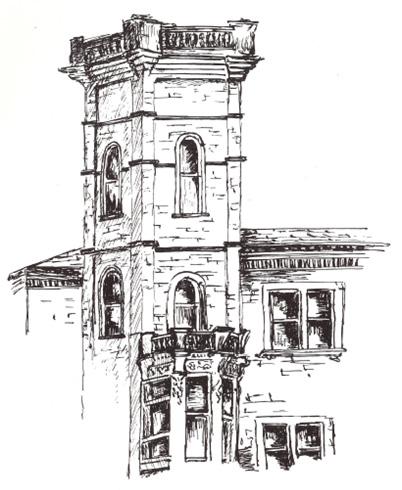
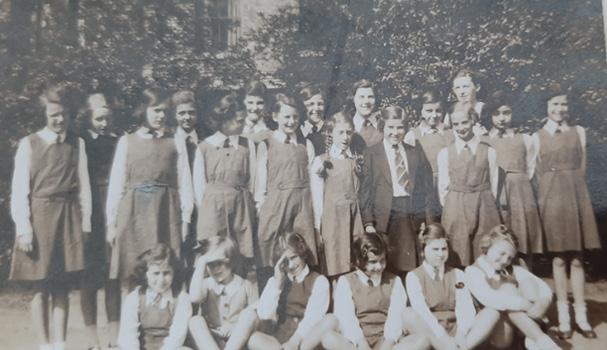
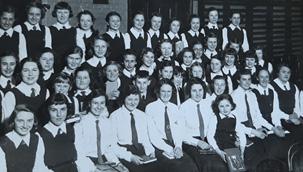
The sun sank slow behind the clouds; A little whispering breeze arose, To frolic through the silent woods, Down where the tiny streamlet flows. And o’er that streamlet’s grassy banks, Upon a willow’s branches brown, That zephyr found a tired leaf That winter’s gales could not shake down. It blew and blew and blew and blew, Till in the east shone rosy dawn; And still upon that willow brown, There hung that little leaf forlorn. And when the sun was overhead, It found it could not blow it down; It went to fetch a friend or two, (And all were blowers of renown).
Oh! what a bustle, and oh! what a scurry; Tall girls and small girls, each one in a hurry; Whatever is all this excitement about?
Let’s go to the High School, and then we’ll find out. For weeks before Christmas, each one has been busy, From the Staff, to young girls, with top-nots all frizzy; To Miss Brooks we have been, a poor family to find, Ideas for their comfort, we all have in mind.
Kind patrons to us, many boxes are sending, Whilst Old Girls spend Mondays, by patiently mending, At decorating and packing, each one is adept, And all contributions we gladly accept. The mistresses also, are working with zest, And mothers, and Old Girls, are doing their best, To make people happy, this glad Christmastide, Who are old, ill, or lonely or in poverty bide.
At last all is ready, on lorries we go, We are all wrapped up warmly, and don’t mind the snow, And our greatest reward is the joy on the faces
Of those who receive them, in these dreary places. Please remember, good friends, when next Christmas comes round, To help with this task for which we are renowned, Send all contributions to High School, Park Street, And provide some poor family, with gay Christmas treat.
E.M. EDMONDSON, Form IV Lower
Written during evacuation and printed in Mary Palmer’s ‘Horncop Scrap Book 1940-1945’
Group of Senior girls from Hull High School, Kendal, during evacuation. Photograph courtesy of M.S. Clark/Tranby Archives. HORNCOP
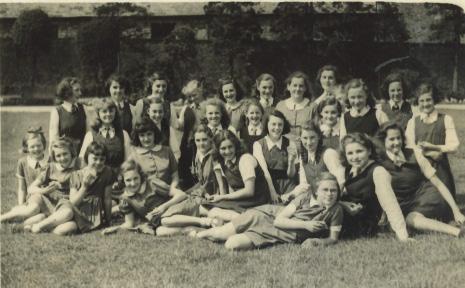
H is for hat that we wear for a walk, A is for Art when we giggle and talk, P is for Panama made out of straw, P is for pancakes that we all adore, Y is for yew that grows in the grounds, D is for diction when you make sounds, A is for apples that we help to pick, Y is for yarrow that makes me quite sick, S is for Sally who’s written this rhyme Perhaps she will write one some other time. S. NEWGROSH
H is for Hawbarrow where some people sleep
O is for oranges that don’t often keep R is for Rangers who help our Guides N is for naughtiness the Staff can’t abide C is for cabbage we all do hate O is for October when apples are late P is for peace that comes after war
Then we won’t have HORNCOP anymore.
A,ATKINSON, C. CHATTERTON, S. HENDY, D.PALMER
WHAT IS THIS LIFE, IF FULL OF CARE WE HAVE NO TIME TO STAND AND STARE UPON THIS SCENE? A THOROUGHFARE –OF CHILDREN COMING IN AND OUT WITH CATS AND DOGS TO JOIN THE BOUT OF STAFF IN SEARCH OF THIS AND THAT, OF PEOPLE ASKING WHERE AND WHAT, OF OPEN DOOR, OF DESK AWRY, OF COMFY BED, WHERE CHILDREN LIE. LIKE OXFORD CIRCUS WITH A CROWD OF TRAFFIC MILLING ROUND AND ROUND, NOW SURGING IN NOW SURGING OUT TO FIND MISS BROOKS; WITHOUT A DOUBT SHE’S IN THE MIDDLE OF THE ROUT. A CRAFT SHOP WITH AN ACTIVE REPUTATION, MISS BROOKS’ ROOM A HIVE OF ANIMATION! E.M.B.
END OF TERM TAXI
6 A.M. AT CHESTNUT HOUSE CAN YOU ALL GET IN?
SYLVIA CAN’T, WHAT SHALL WE DO?
SQUEEZE UP, SHE’S QUITE THIN. THIRTEEN PEOPLE, CASES TOO, DARKNESS ALL AROUND, THE TAXI CREEPS OFF UP THE HILL WITH LABOURED PANTING SOUND.
MEANWHILE AT HAWBARROW : -
OH WHERE, OH WHERE CAN OUR TAXI BE?
OH WHERE, OH WHERE HAS IT GONE? WE’LL BE STRANDED HERE AND WE’LL MISS THE TRAIN AND I’M SURE WE’LL NEVER REACH HOME. OH HERE IS A TAXI LET’S ALL GET IN. POOR JOAN’S FALLING OUT OF THE DOOR. THE TRAIN HAS LEFT MILNTHORPE, WE’LL RACE IT TO CARNFORTH AND HOPE WE’LL BE STRANDED NO MORE.
ANON.
OH, WHAT HAS MADE ALL THOUGHTS THAT E’ER I HAD JUST FLEE MY MIND; AND ALL IDEAS SEEM MAD? IT SEEMS THAT VERSE COMES ONLY TO TH’INSPIRED, AND VERSE WRIT THUS IS FIT TO BE ADMIRED. ‘TIS VAIN TO THINK THAT I SHALL EVER WRITE, SAVE VERSE THAT’S BAD, NOT FIT FOR HUMAN SIGHT. GREAT MILTON, WHOM THE AGES RIGHTLY FAME, NE’ER WROTE BAD VERSE. TO HIM THE WORDS JUST CAME. IMMORTAL SHAKESPEARE NE’ER FOUND IT AS HARD TO WRITE HIS THOUGHTS IN WORDS, AS I, POOR BARD!
IN VAIN I THINK: IN VAIN I LIFT MY PEN BUT VERSE CANNOT BE FORCED, NO, NOT BY MEN (OR WOMEN), THOUGH THE WILL BE THERE TO WRITE ‘TIS FATE, MY VERSE SHALL NEVER SEE THE LIGHT. SUCH GIFTS ARE NOT FOR ME TO FEEL OR KNOW, I MERELY GATHER WHAT THE POETS SOW. M.A.E. SCOTT, UPPER VI
A warm light glimmers in the darkening gloom There by the lakeside. Far from crazy cities These flames leap up and dance, spirits on a tomb; The grey dusk answers not but only pities. In hymns of glory now, clear voices ringing Make the great hills echo the eternal theme Praise to Almighty God, for ever singing For beauty of mountain, field and wood and stream. How can the darkness give reply to this The powerful outburst of emotion true? Dark knows not light, nor joy, nor bliss
Nor any real delight forever new. Who were the singers? Not an angel throng, Only God’s children in full-throated song.
S. NEEDLER, Form VITHESE I HAVE LOVED (AFTER READING THE GREAT LOVER BY R BROOKE)
THE COOL, REFRESHING SMELL OF RAIN AFTER IT HAS WATERED PARCHED GROUND; THE ECHOES OF AN ORGAN IN A CATHEDRAL; THE RED SUN GLOWING THROUGH THE MIST; THE CRACKLING WITCH-LIKE FLAMES IN A WOOD FIRE; AND THE BLUE BITTER SMOKE OF WOOD; SUNSETS; AND THE BLACK SILHOUETTES OF BIRDS FLYING TO THEIR NESTS AT NIGHT; THE SHRILL, PIPING SONG OF A THRUSH; THE DIGNITY OF A HIGH MOUNTAIN; PURPLE HEATHER ON A HILLSIDE; THE CRACKLING SOUND OF BRACKEN UNDER THE FEET; THE FRESH, NEW SMELL OF PAPER. G. HARRISON, FORM LOWER V
THESE I HAVE LOVED (after reading The Great Lover by R Brooke)
The lonely seaside when trippers have gone home, A stormy boiling sea crested with white foam, The snow on tall dark trees, and grey hills Bleak and bare. Seeing famous places And the thrill and busy atmosphere Of railway stations. My bed on cold mornings, The sharp keen bite of winter air, The smell of tar, sacking and sea water; Wet roofs and the bright lights of little towns, Craggy moors and undulating downs.
S. KIRKLAND, Lower V
AN ODE (to the dog next door who has recently devoured my bulbs)
Whilst walking in my garden one fine day
A small mischievous puppy I espied, Thus next door’s spaniel came to me to play
And whilst I viewed my daffodils, my pride, He gambolled at my feet, that pup in joy And finding an old ball, he, with delight Tossed it up, with glee, as a small boy
Would likewise do; but ah! he threw it right
Upon my daffies’ royal shoots, and then Feeling it gone, he followed it with care, And whilst I shouted once and yet again, From out the earth, he threw into the air
One big brown bulb, and catching it began, To masticate it, lying on the soil: I seized that useful thing, the watering can I threw it o’er him – how he did recoil!!
Oh! Powers that be, don’t send me any more Like that dear spaniel pup – the dog next door.
A.C. MALLETT, Lower V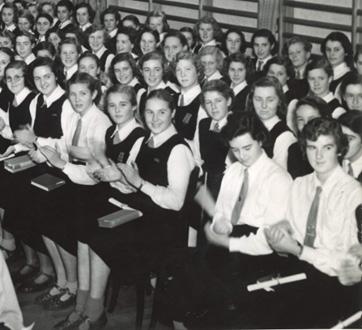
I HEARD A WEAK CRY IN THE NIGHT, SO I CALLED MUMMY WITH ALL MY MIGHT, THERE, IN HER ARMS, WAS A BABY SO SMALL THAT I THOUGHT SHE WOULD NEVER GROW AT ALL.
HER HAIR WAS FAIR, HER EYES DARK BLUE, HER COMPLEXION WAS LIKE FLOWERS IN THE DEW, IN HER COT, LIKE BIRDS WARM IN THEIR NEST, SHE SNUGLY LIES, THE BABY I LOVE BEST.
A.WARREN, FORM II.
One morning in the early Spring, I heard the little birdies sing, They sat up in a chestnut tree, And sang a little song to me.
The trees looked up in great surprise, As they heard the birds’ sweet cries, “’Tis Spring,” they shouted through the trees, “It’s time you opened out your leaves.”
The flowers too began to peep, And wake up from their dreamy sleep, The sun shone down upon their heads, And said, “Come out of your snug beds.”
J CHATTERTON, Form II.
This is the tale of Penelope Anne, With her nice little, blue little, watering can. She waters the flowers and she waters the weeds, She waters the path but quite misses the seeds, She pesters the family from morn until night (She can’t turn the tap, the tap is too tight) To get her some water, keep filling her can, Then down the wet path trots Penelope Anne. Her shoes and her dress get as wet as can be, But she doesn’t care, so why should we? She feels so important with her can of blue, For Penelope Anne is only just two.
A.E. WHITE, Form Upper III1952.
The poppy’s red, the speedwell’s blue, They seem to be nodding a greeting to you. The rose is pretty, the pansy’s shy, And the cornflower’s blue as the summer sky. The wayside’s brightened with cranesbill sweet, While daisies bloom in the grass at our feet. The pimpernel’s timid, the sunshine loves she, And the buttercup’s yellow is pleasing to see, The chicory’s blue in a cornfield yellow, He really is a handsome fellow. The vetch likes to make the hedges gay It looks very pretty when tied in a spray, But they all go to sleep when the moon shines bright And don’t wake up till morning light.
When Millicent Mary went out for a walk
She wouldn’t laugh and she wouldn’t talk, She snapped at her mother and dragged her feet
She refused to walk so she sat on a seat.
Millicent Mary was in a bad temper
She kicked over a bucket full of distemper, It spilt all over her nice new frock, Soaked her jumper, and spoiled her sock. Her mother was cross and sent her to bed
For she, poor thing had an ache in her head.
“Oh,” cried Millicent, banging on the door “I’ll never behave like that any more.”
A.V. NICHOLSON, Form Lower III
Yesterday has gone for ever,
All its glories pass away, Like a sprig of dying heather, ’Twill wither, shrivel, then decay.
All its happiness and laughter, Fade away into the blue, To be buried ever after, With the dreams which ne’er came true.
Now the day is growing older, As it makes its way for night, But tomorrow’s growing bolder, As it fights towards the light.
Soon today will go for ever, All its glories pass away, Like a sprig of dying heather, ‘T will wither, shrivel, then decay.
J.B. BLACKBURNE, Form Upper IV.
Examinations loom ahead, A very dreary thought, And now, too late, we realise Just how much we’ve been taught. There’s all those History dates to learn, Kings’ names and battles too, Prime Ministers, the Acts they passed, And who succeeded who. In Geography we have to learn Which countries export what, And whether London’s temperature Is cold and moist, or hot. Then Science. We’re supposed to know What turns pink litmus blue, And what you mix with oxygen To form some CO2. The thought of Maths, and French exams, Makes me feel quite sick, Already I’m quite sure I’ll fail In my Arithmetic. I can’t do “logs” or Income Tax, Or even long division, But I’d better finish now And do some more revision.
S.M.MERRIFIELD, Form Lower V
I have a little robin friend H e has a bright red breast, A nd when the wind begins to blow
e flies back to his nest.
H is nest is in a big oak tree S o tall and fat and strong A nd it is made of moss and twigs I t lasts the whole year long.
H e’s very busy in the spring F or he will have to try,
o teach his little ones to sing
nd afterwards to fly.
A nd when the winter comes again H e sings his little song, A cheerful tick, tick, ticking tick
Form II.
hat lasts the whole day long. M .R.
We have a little kitten, All furry, black and white, He plays and frisks the whole day through And goes to sleep at night.
The birds he loves to stalk While hidden in the grass, And little mice with beady eyes Watch our kitten pass.
Our kitten has a funny mew, It’s very very small, And when he tries to spit and hiss, There’s little sound at all.
When first we got our kitten So lean and thin was he, But now we’ve had him just a month He’s very fat to see.
We’re very sorry for quite soon, From kitten small and fat He’ll change as if by magic Into a full-grown cat.
M.A. JACKSON, Form Lower III.
When I consider how my wit is spent Ere half my days, in this small school of ours, And that one précis which takes hours and hours Lodged by me useless, though my soul more bent To serve therewith my mistress, and present My best attempt, lest she, returning chide –Doth she demand a précis, brains denied, I often ask: - But Conscience, to present That murmur, soon replied: She does not want Our summarising wrong, for all our pain. We bear the burden, try our best. Our state Is hopeless. We, at her austere command, Struggle with Sidney’s childhood quite in vain: We only have our books sent back again. P.B. DYMOND, Form Upper V
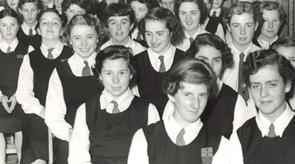
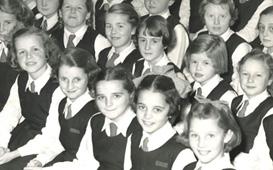
I love to wander by the sea
When the waves are tossing high; And a strong wind blowing the spray Like a haze in the stormy sky.
I love the stretch of golden sand
Left smooth by the ebbing tide; Scattered with stones and shimmering pools,
Where shrimps and small crabs hide.
I love the calm of the sheltered bay
Where the fishing cobbles rest, Returning after a wearying day, When the sun is in the west.
I love the breeze that blows across That silent lonely strand, And the sonorous moan of the wafting waves, Receding o’er the sand.
M. RINGROSE, Form Upper V
Oh the little swallow, Peeps from a hollow, To sing, to sing, to sing!
And the little blue bell Nods her little head To ring, to ring, to ring!
And the blue butterfly Soars gracefully in the sky On the wing, the wing, the wing!
Oh these are the happy blue things, That happen in the blueness Of the blue Spring.
Down goes a head, up goes a tail, It’s Toby the pony over the rail, He’s off like a shot to join the others, Some are his sisters, some are his brothers.
They’ll frolic and play, Till the end of the day, And soon the sun will set in the west, Then into the stable he’ll go for a rest.
A.A. KEMP, Form II
My first is in daffodil but not in pansy
My second is in hollyhock but not in tansy.
My third is in crocus but not in columbine
My fourth is in tulip but not in celandine, My fifth is in figwort but not in verbena
My sixth is in ragwort but not in nemesia
My seventh is in foxglove but not in fuchsia, My eighth is in rose but not in dahlia
My whole is a word on the badge of the school, To follow this principle would be a good rule.
I sit in class, the history lesson drones, My eyes drift to the window, monotones Of green and grey show thro’ the misty rain But far beyond my memory lives again.
I sit upon the cliff top, sheer and brown, On high, a radiant sun is blazing down And gentle spicy breezes from the sea Bring dreams of far Baghdad and Araby.
And on the broad horizon, ships are seen, Where azure meets and merges into green While wheeling gulls in endless motion glide Or feed in families by the ebbing tide.
With steady moan, a plane comes sailing by Trailing a target sleeve across the sky Two swift lean escorts loop or roll on back Then, weaving, dive into attack.
With shrill crescendo scream; guns all ablaze! Rat! Tat! Tat! Tat! “Child you must mend your ways Wake up! You’re half asleep. Take fifty lines! When did the Cretans become Philistines?”
I have a little puppy
We always call him Pat His little paws are ginger His tummy’s round and fat.
He’s mostly quite a good dog But has some naughty habits He knows it’s wrong but off he goes Chasing after rabbits.
Much later he comes back His tail between his legs To ask us to forgive him He just sits up and begs.
J.H.M. GARDNER, Form Lower III
SOFTLY AND SILENTLY FALLS THE SNOW SWEEPING AND DRIFTING GENTLY LAYING ITS LOVELY WHITE SNOWY FLAKES
ON THE BOUGHS OF EVERY TREE.
COVERING UP THE GAY, GREEN GRASS, MAKING IT COSY AND WARM, KEEPING IT, TILL THE WINTER IS PAST, SHELTERED FROM HARM.
ALSO, THE LITTLE SPARKLING STREAM WHICH USED TO TINKLE AND FLOW AND SING A SONG OF A HAPPY DREAM IS COVERED WITH ICE AND SNOW.
S.J. WALTON, FORM II
TARTARY
If I were Queen of Tartary Myself and me alone, My bed should be of jewelry, Of rubies red my throne. And all my bedspreads made of silk, My curtains satin, white as milk, My knives bejewelled at the hilt My floors of marble stone.
If I were Queen of Tartary I’d wake to music gay, And dress in silk embroideries A clean one every day. And in my garden flowers sweet And daisies clustering around my feet And trees that shade me from the heat In which the squirrels play.
M.A. JACKSON, Upper III
I saw him under the white moon The little white horse, with his head held high. A small smooth hoof poised short, then soon He plunged it to the ground. A momentary sigh Left the branches of the tall pine trees, grey in the night. A sharp swift turn, a body fashioned of light Giving that creature a glory, unstained, pure and white.
Stay! Oh stay with us little white horse of light.
The leaves of the pine trees whisper aloud, But the peace of the echoing forest is lost abroad. A clap of thunder rends through the filmy cloud, A white spark of lightning rests on his poised proud head.
Then he’s gone, a phantom no more, but dead. He is lost for ever, and now I sometimes wonder, If it was a little white horse that I saw, Or only a streak of lightning, breaking asunder And followed by a clap of echoing thunder.
A. JUNIPER, Form Upper IV
A small lonely figure
Ragged-clothed, dreamy-eyed, He draws his little vessel
In the ebb and flow of tide; Remote, absorbed, untiring, In ponds and tiny streams He wanders far, exploring The unknown world of dreams.
Each pond is a large ocean, The sands are desert tracts; The drops of water gently falling On the stones are cataracts; To America, the Azores, He sails, and to Cathay; Lives through a hundred stories In one morning’s happy play.
M.R. MASON, Form Lower V
Perchance in June, this month of scenes, Of moonlit nights and mystic dreams, Of scented flowers which gaily ’dorn, The waving fields of ripening corn, Of days of laziness and sleep, And slumbers where the willows weep, Of blossom in the haunted glades, Where shadows creep beneath shades, And drowsy woodland creatures thrive, Where wild forget-me-nots contrive To form a carpet ’neath the feet
To sooth, in this oppressive heat, Perchance, from gallant tales of old Appear the heroes, courageous bold Princes, barons, kings, and knights, Witches, warlocks, elves and sprites, Gods and nymphs who haunt the lakes, Dragons, cyclops, spotted-snakes … Alas, ’tis I who speaks too soon –I merely said “Perchance in June”.
(The above poem gained first prize in a competition for the Collins “Young Elizabethan”.)
Dusk on the Solutré, a proud imposing peak, Which stands, a rugged rock, rough-hewn and rude, Triumphant, as a paradise for those who seek Solace, from the world, below, and quiet solitude.
Shadows from the setting sun are cast, which gently fleet On the steep and lower slopes, amongst the straggling lines, Of bush and boulder, cooler now, from intensive heat, And creep and linger long between the rows of purple vines.
A pounding, rolling mass of angry green, With foam-capped crests of frothy white, Here and there a gleaming, silken sheen, Shoals upon the billows as they pound in the night.
The moon, like a galleon on a silver foam Lulls the hungry billows with the misty shroud
Of her silken hand, then rides back home To her rest, behind the angry thunder cloud
That waits o’er the ocean, like a dark veil hanging by. Then a fretful awful silence, broken By the fierce flash of lightning as it streaks across the sky.
Night settles on a village small, which is nestling deep In the hollow of the rock; and tolls the evening bell, Where Lamartine, the poet, stands alone, while others sleep, And smiles upon this scene of rest, which he knows so well.
Proud rock of time, what gallant tales and mysteries Of old, have passed beneath your massive walls of might, As passing flocks, for you alone have seen all histories Untold, in still solemnity; thus descends the night.
J.B. BLACKBURNE, Upper VIAs if death herself had spoken. Darkness pervaded until the moon gently shining, Caressed the boiling, turbulent sea with a calm –A peace from behind the silver lining Of the great thunder cloud, she’d had to quell, Before she lulled the mighty swell.
S. ROBERTSON, UpperThere are Joy and Diana, Catherine’s and Pam, Who all the time do the best they can. Carole’s, Virginia, Anthea and Margaret They try in netball to hit the target, Jennifer, Julie, Gillian and Jean, Some say they are as light as a bean, We’ve Susan’s three and Anne’s four, What a mix up if we got more. We’ve got our heavy ones, too, it seems With Dinah, Mary and Josephine’s, Elizabeth’s too, but Christine’s few Including two that are quite new. A jolly lot, English and Tartan How sorry we are for poor Miss Barton.
S.B. PARTRIDGE,Form II
THE HOUSE MISTRESS
THE ELDERLY LADY WHO LIVED IN A SHOE, WHOSE PREDICAMENT MUST BE FAMILIAR TO YOU, HAS PROBABLY VERY SMALL REASON TO GROUSE, COMPARED WITH THE MISTRESS IN CHARGE OF A HOUSE.
LIKE HER, SHE HAS NEVER A MOMENT TO SPARE FROM THE NUMEROUS YOUNG WHO ARE UNDER HER CARE; BUT FATE, IN THE RHYME, SPARED THE LADY THE PAINS OF TRAINING AS WELL THEIR INCIPIENT BRAINS.
THE TORTURE BEGINS WITH THE NINE-TWENTY BELL SHE PREPARES, WITH THAT WARNING, ANY RIOTS TO QUELL. TO GIRLS WHO ARE LATE, WHO MISSED THE SCHOOL ‘BUS, SAYS, “IS THERE REALLY A NEED FOR THIS TERRIBLE FUSS?”
AFTER PRAYERS THE HOUSE MISTRESS COMMENCES TO TEACH (ANY SCOLDINGS SHE’LL GIVE, AND SERMONS SHE’LL PREACH) THIS HERALDS A DAY OF HOURS, WHEREIN SHE MUST HELP THEM TO CONQUER ORIGINAL SIN.
SHE MUST SIT ON THE SNEAK, PLACE RESTRAINT ON THE ROUGH, BE SEVERE WITH THE SLACKERS, WHO DON’T WORK ENOUGH; SHE MUST SCOLD, SHE MUST PRAISE, SHE MUST MAKE THOSE SEE REASON, TO WHOM GAINING ORDER MARKS ISN’T “HIGH TREASON”!
AT TUESDAY’S HOUSE PRAYERS WE MUST HEAR THE REPORT ON HOW BADLY, OR WELL, THE HOUSE DID IN ITS SPORT; ORDER MARKS, MERIT MARKS, ALL ADDED IN, SHOW WHAT’S BEEN DONE OR WHAT MIGHT HAVE BEEN!
FOR FUTURE HOUSE MISTRESS – ADVICE IN HER EAR, THE WORK WILL BE HARD, THE DEMANDS BE SEVERE. BUT IF THERE’S SUCCESS IN THE BACK OF HER MIND, SHE MUST BE RESPECTED, PATIENT, AND KIND.
P.M. NEWTON, UPPER VI
I wonder why I sit and sigh, Elusive inspiration seek, And gaze aloft with fevered eye And pencil thrust into my cheek.
I wonder why my wilful muse My painful strivings won’t obey, Words to describe those heavenly views Are shadowy forms which slip away.
I wonder why this wretched sum Of algebraic formulae Should stretch from here to kingdom come I’m sure the answer’s minus three.
I’ve two long graphs and French to come, My Latin brings me to my knees, In ligneus and arborum
I really can’t see wood for trees.
“Now is the springtime of my youth!” So my beloved parents say, And yesterday I cut a tooth That ached like billy’o all day.
I wonder if, in future days, When I at last perfection find, Will there emerge thro’ this dense haze Those wondrous qualities of mind?
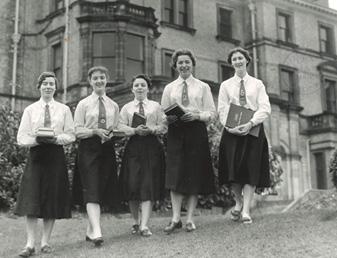
Winter has come and the trees are bare, The days are short, there’s a nip in the air, The swallows have gone on their long, long flight, The curtains are drawn and the fire burns bright.
The wind is blowing the trees about, There’s ice on the pond and the children shout, They laugh and romp in the glistening snow Which makes their cheeks and fingers glow.
A.M. HORNBY, Form IOnce two children went for a sail, After some time there came a gale, And it tried to blow over their tiny boat, But resisting all, it kept afloat. The gale was lucky, for it brought them Every kind of treasure, pearl and gem. It found its way home, did their tiny boat, Then over the treasure they did gloat.
C.BROWN, Group V Preparatory(with apologies to Samuel Taylor Coleridge, The Ancient Mariner, and Mathematics and English teachers)
All in a still and quiet room, The candidates at last Have reached the dreaded Maths exam, And time is passing fast.
Page after page, page after page They write, their brains alive, As busy as a buzzing bee A-working in the hive.
Paper, paper, everywhere And faster flows the ink. Paper, paper, everywhere, There’s hardly time to think.
Their very arms did ache, O Maths! That ever you should be Yea, π and logs all send them mad And oh! those formulae!
About, about with words crossed out The pen nibs, scratching, write. The candidates who slave and strive At last give up the fight.
And they in dreams assurèd were Of the Maths that plagued them so. Full three times two hours they had worked. Like Maths exams? Gosh no!!!!!!
J.S.C. JONES, Upper V
The trees and shrubs within the park Are standing, bare and stiff and stark Where once swung many a leaf. Then Autumn comes and strips them all And leaves them all in Winter’s thrall With nothing left but grief.
The flowers fade away and die, The swallows leave the English sky And fly to warmer climes. The Summer’s gone away, and left The English gardens, all bereft Of bluebell’s fairy chimes.
The foxgloves and the harebells both Have left, and all the summer growth Has turned to winter brown. The song thrush and the blackbird’s nest
All left to ruin, like the rest Are filled with dirt and down.
But have no fear, for still survives Beneath this dreaded loss of lives
A breath of summer air. The buds and bulbs so strong and warm Will live to fight through many a storm With nature’s kindly care.
J.I. SMALL, Upper IV
HOMEWORK IS AN AWFUL BORE, I WISH IT WERE AGAINST THE LAW. AT NIGHTS I’D LIKE TO READ OR VIEW, BUT THEN I THINK, “THERE’S PREP TO DO.” NO SOONER HAVE I WRITTEN AND READ THEN DADDY SAYS, “IT’S TIME FOR BED!”
IN SUMMER I LIKE TO BE OUTSIDE AND TAKE MY PONY FOR A RIDE; IN WINTER IT IS NICE TO SIT AROUND THE FIRE AND READ OR KNIT; THERE’S USUALLY SOMETHING NICE TO SEE ON B.B.C. OR I.T.V. BUT JUST AS I AM HAVING FUN MY PARENTS SAY, “COME ON, THERE’S STILL YOUR HOMEWORK TO BE DONE.”
V.E. MOODY, UPPER III
Fall, fluffy flakes, fall softly on the ground; Cover the dark earth with a robe of white. Change to old Winter’s icy throne the mound Where fairies dance, and goblins sport at night. Fall, dainty flakes upon the graveyard old, Where sleep in peace forgotten heroes bold.
Rest on the branches of bare stripped trees, Cover the traveller struggling with the wind; Make full the rivers, locks and lakes hard freeze, Fall, that you may this busy world remind, This is the time when Christ to us was born, Sing, happy choirs, for this is Christmas morn.
A.K. ROCKLEY, Upper IV
One winter’s morn two thousand years ago, A Holy Child was born of virgin mild Inside a stable sheltered from the snow, And Jesus was that babe, God’s Heavenly child. He was the infant born this special day, And Mary was his mother kind and meek, Who placed Lord Jesus in a crib of hay And welcomed those who came her son to seek.
When hearts are glad and spirits filled with joy, We must remember God’s dear son was born In Bethlehem as any other boy
On Christmas Day so early in the morn, And we must like God’s Holy Angels sing, With joy and gladness: “Glory to our King”.
M. MUNRO, Lower VSnow-capped peaks ’neath the moon’s silver beam; Waving palms where gaudy parrots scream; Gloomy caves where precious jewels gleam; All in a dream.
Sapphire seas and waves with foaming crests; Bright-eyed, brown robins with ruby breasts; Cool, emerald moss where a violet rests; All in a dream.
Sunlit fields where butterflies dance; Clover-scented meadows where horses prance; Rippling, tinkling streams where sunbeams glance; All in a dream.
A grim, grey castle high on a hill; The skeleton of an old windmill; Trees by a haunted pool, deep, dark, still; All in a dream.
Peacocks with brilliant plumage, dazzling, gay; A golden-domed city, far, far away; A red-tinted sky at the dawn of day; All in a dream.
A stately galleon on the placid sea; A seagull wheeling above, wild and free; The salty tang of the breeze on the quay; All in a dream.
A deadly torrent of poison black; An earthquake with terrifying crack; The threatening howl of the grey wolf pack; All in a dream.
And though ’tween white sheets I seem to lie, My thoughts through the tight-shut window fly, To watch the misty clouds gliding by, All in a dream.
S.J. WALTON, Lower IV
I have a small black poodle, Who is as naughty as can be, A bundle full of mischief, That’s what she seems to me.
She frolics in the garden, And chews my slippers up; Walks in and out with muddy paws, Oh what a tiresome pup!
Her coat is soft and curly, Just like a woolly lamb, She wears a bright red collar, The shade of strawberry jam.
I love my little dog, She’s very dear to me, My darling cuddly poodle, Whose name is ‘Ma Cherie’.
C.L. HARNE, Form II CHRISTMAS
The snowflakes are falling, The earth is all white, It sparkles and shimmers, Beneath the sunlight.
The icicles glitter, Like silvery stars, But there are no snowflakes, As wonderful as ours.
For our snow brings tidings, That Jesus is born, And we are rejoicing, On this happy morn.
C.E. WALTON, Form I
Bryn Thomas was a Welshman Of credit and renown, A jet plane pilot brave was he Of famous Cardiff Town.
Then said Bryn’s sweetheart to her dear, “Though engaged we’ve been For so very many months, No wedding day we’ve seen.”
“Let us be married very soon And in a motor car, Go to the Church at Pontypridd And see the old vicar.”
So the next week the car arrived And took them to the church: There they were married by a Priest Whose name was Father Berch.
They then went off to a hotel To eat their wedding cake, The Bride’s relations came as well, Which was a great mistake.
Her grandmama, and grandpapa, Her great grandfather too, Nephews, nieces, young and old, Were there to see it through.
They ate their way through everything, It really was a spread, And when they found no more to eat, They all went home to bed.
The Bride and Bridegroom then went off In Bryn’s new aeroplane; They went to spend their honeymoon, Just off the Coast of Spain.
E.A. SPEED-ANDREWS , Upper III
WHERE STEEP, SCARRED CLIFFS BREAK SHEER INTO THE SEA AND ANGRY WAVES RETORT WITH SHARP-TOOTH’D SPRAY; WHERE COLD-EYED GULLS SWERVE HIGH TOWARDS THE CLOUDS THEN SWOOP TO SEIZE THEIR UNSUSPECTING PREY. THERE STANDS TINTAGEL STARK AGAINST THE SKY; IS THIS WHERE ARTHUR LIVED IN DAYS GONE BY? THE GULLS CURVED DOWN WITH HARSH, UNTUNEFUL CRIES, CURVE DOWN TOWARDS THE DEEP MYSTERIOUS CAVES; WHERE TINY FISH ARE HID IN QUIET POOLS FAR FROM THE RESTLESS BEATING OF THE WAVES. HERE MIDST THE SEAWEED AND THE MOSSY SHELLS IS WHERE MERLIN WOVE HIS MAGIC SPELLS? WHEN NIGHT IS COMING SOFTLY THROUGH THE CLOUDS AND SCATTERS ALL HER STARS ALONG THE WAY; A GENTLE MIST CLINGS TO THE DARKENING ROCKS FORMED FROM THE GLISTENING DROPS OF SALTY SPRAY, AND ARE THEY ARTHUR’S MEN BESIDE THE CAVE OR ONLY SHADOWS – SHADOWS FROM THE GRAVE?
B.SHORT, UPPER III
“Now just fill in this form”, she said, “And you will go to France, You’ll learn to speak that foreign tongue, You mustn’t miss the chance.”
At last I had arrived in France; My French friend met me there. I tried to say a word in French, But she could only stare.
She could not understand a word, Of all I tried to say; She spoke so fast, and I so slow, We struggled all the way.
Four weeks later when I left I spoke a word or two, I found I could say “oui” et “non”, Et “comment allez-vous?”
J.C. HALLIWELL, Upper IVLatin is a language – involved as all the rest, If you’re going to do it properly you need a lot of zest, Must it be such double Dutch – I’ll never get it right, ‘Quid opus est verbis’ – maybe I’m not too bright; But Latin scholars really need a lot of common sense To put all the words and phrases in the proper case and tense.
I wonder why we learn it – they say it is a ‘must’, With all this thought and learning, our brains will never rust. But I’ll never be a linguist – it all seems Greek to me, And in this thought I’m not alone – the others all agree. The conclusion I’ve arrived at – ‘O me miserum’ Latin will be Latin – ‘Ad Infinitum’.
S.B. PARTRIDGE, Lower IV
There are dozens of dogs down Tranby Lane, And I think I know them all by name: There’s Rocky and Dandy and Angus, too, That is to mention just a few; There are Terriers, Boxers, Poodles and Chows, There must be a dog in every house. They come in our garden and dig up the lawn, They’re even around when I wake up at dawn. But of all the dogs there is none that’s sweeter, Than my little black and white Terrier – Peter.
Soaring over the tarns and lakes, High in the summer sky; With cold and mist of dawn he wakes, Watches the dark night die.
He goes a-flying over the hill, A tasty morsel he spies; But one second late he is with the kill, And the rabbit in safety lies.
With his powerful wings, and strong curved beak, And neck of a golden hue, His sharp brown eyes, his prey to seek, He soars into the sky of blue.
This bird with his crown of gold, He is so proud and regal; There is no other bird so bold As the beautiful Golden Eagle.
B.HUDSON, Lower IV
They go over endless, ancient plains In timeless, endless existence. Their blue shadows glide over the sands Behind them, in front of them –
The Nomads of Africa, The Blue Men of Morocco, To Mecca, the Holy City, Belonging more to the Orient Than to the Occident. City of primeval cults And modern automobiles. But they care not for the present Nor the future –These wanderers, old men with wisdom, Living with time, not in time.
The blue robes The brown rocks And the white, white sands To the mountains. They do not fear the mountains
As they fear the motor roads. They turn to the East to see the sun High in the African Heavens –They turn to the west and watch the sun Sink glowing, behind the African plains. Were our people once like this –Living on earth, guided by animal tracks, Resting by the sun Contemplating life Assured by death?
S. ROBERTSON, Upper VIGrown-ups never understand The things that children do. For instance, if I played with mud, There would be a to-do.
“Go and wash your hands,” they’d say, And “Go and brush your dress.” Really anyone would think
It was a dreadful mess.
And if I found a puddle Where I’d love to splash about, A grown-up would be sure to come And say “Quick, child, come out.”
And once I climbed a nice big tree And nearly reached the top, But then a grown-up came and said “Come down or you will drop.”
But I don’t care for grown-ups’ chatter, I’ll have fun with other things, Now I think I’ll go and play With Mummy’s diamond rings.
H.J. WOOD, Form IIOne day while walking up the street, A strange old man I chanced to meet, His clothes were from a different age, I guessed at once he was a sage.
A wise old man without a doubt, I longed to ask him all about The things I find so hard at school, But feared he’d think me just a fool!
I fired questions hard and fast, On subjects puzzling in the past, His wise old face looked lost in thought, “Just listen hard to all you’re taught.”
J.E. FOLLAND, Upper III B
WATER
DRIP, DRIP, DRIP, CHATTERS THE TAP ALL DAY; DRIP, DRIP, DRIP, IS ALL HE CAN SAY; DRIP, DRIP, DRI-I-I-P, TILL SIGHING HE FADES AWAY.
SWISH, SWISH, SWISH, THE MERRY STREAMLET SINGS; SWISH, SWISH, SWISH, I FLY WITH SILKEN WINGS; SWISH, SWISH, SWISH, I’LL JOIN THE MOUNTAIN SPRINGS.
SPLASH, SPLASH, SPLASH, ON BABY’S CHERRY NOSE; SPLASH, SPLASH, SPLASH, ON THE PARSON’S SPLAYED TOES; SPLASH, SPLASH, SPLASH, A CLOUD, HIS SHINING SEED SOWS.
S.N. HOGARTH, LOWER IV
All was silent, all was still, The little town beneath the hill Was bathed in rosy light.
The old men smoked beneath the trees, And even the buzzing of the bees Was finished for the night.
Who knows the peace of such a scene? Who knows the beauty of the light? Who knows the happiness of soul As great sun says “Goodnight”?
J.C. HALLIWELL, Lower V
THINGS I DON’T LIKE
I don’t like cheese, I don’t like ham, I don’t like onions, But I do like jam. I hate bitter lemons, I hate date slice. What I really like, Is a great big ice. I think I like tea, But I’m not sure of that. I do like water, And I hate our prickly mat.
J. STRACHAN, Form I
How I love all animals!
I love them all so much, That the rabbits sleep in my bed And I sleep in the hutch.
Camels in the kitchen, Lions in the sink, Ant-eaters in the porridge, And tadpoles in the ink.
It really is preposterous, Whilst trying to scrub the floor, To have a great rhinoceros Come crashing through the door.
Elephants swimming in the bath, We even have a pony Eating all our Turtle soup With cheese and macaroni.
Kangaroos swimming up the wall, Monkeys drinking gin, Hedgehogs cooking treacle tart –Oh, what a mess I’m in!
Kittens on the front stairs, Horses on the back, Budgies in the attic, Hamsters in my mac.
Donkeys do my homework, The penguins wash my hair, Will I ever get them out? I really do despair.
P. REID, Lower V.
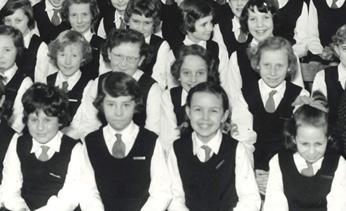
Valerie is my doll’s name, Every day we play a game, I change her frock, I comb her hair Her eyes are blue, her skin is fair. She has a lot of pretty frocks, High-heeled shoes, and some socks. Every day we have some fun And I am sad when the day is done.
Purling and plaining, Go my quick-knit needles, Tea cosies, and hot water bottles From my quick-knit needles. Grandmas and Aunties My presents are for, But I shall keep on knitting More and more.
I know a little puppy, His name is Rikki Tikki. He is very fond of jam And makes his whiskers sticky, He skips and runs all round the house And has never caught a mouse.
Merciless in all its splendour, deep and angry, angry-green, Drowning, driving, strongly-surging, Troubled, tossing, throwing, turning, And so green, that deep sea-green.
Lapping softly in the sunlight, blue and calm, calm- blue, Still and silent, smooth and shimmering, ’Neath the sun like sapphires glimmering, And so blue, that calm sky-blue.
Rushing down the rocky hill-side, white and bubbling, bubbling-white, Tearing, dashing, frothing, foaming, From the tarn for ever pouring, Always white, that bubbling white.
Freshly spouting from the spring, clear as crystal, crystal-clear, Cool and cleansing, thirst-assuaging, Pure and lovely, softly singing, And so crystal, crystal-clear.
A.S. KAY, Upper V
Leaves all a-twirling, Dust all a-swirling, With the wind, wild wind, so fresh and free Blowing from each bush and tree, What a happy sight to see!
The gowns are dancing, The hats are prancing With the wind, wild wind, so fresh and free Whistling through the streets in glee, Pushing, pulling, tearing me!
J. HALLIWELL, Upper VCreeping, gliding, flitting, hiding, Shadows haunt their lonely path. Down a moonlit bank go sliding With otters, to their midnight bath.
Shadowy forms, where the briars grow, Dance about the lanes and fields. We see them, yet search high and low, The ground never a footprint yields.
With outlines blurred, and ghostly shape, Shadows, round the factory and by the jail, Wait, with wicked, ghoulish jape, To leap at you, and watch you pale.
But shadows have a different mood, One of black and definite shape. When the sun beats down upon a wood, Yawning caves ’neath the trees do gape.
So shadows haunt their mystic land, Hanging there ’twixt life and death. Will one day a ghostly hand Snuff out their last fading breath?
And when the cold earth hurtles down The dusty corridors of space, Will the shadowy people and forms have flown To some other mysterious place?
C.HUDSON, Lower V.
Two little bulbs snug under the earth, Trying to get past the stiff turf, Trying to get into the light, Beat all the other bulbs And give them a fright!
MY FIRST IS IN HISTORY, BUT NOT IN GYM, MY SECOND IS IN HOCK BUT NOT IN GIN, MY THIRD IS IN MUSIC AND ALSO IN MATHS, MY FOURTH IS IN ENGLISH BUT NOT IN CRAFTS.
MY FIFTH IS IN WINE BUT NOT IN SHERRY, MY SIXTH IS IN GOOD BUT NOT IN MERRY, MY SEVENTH IS IN RUN BUT NOT IN WALK, MY EIGHTH IS IN KNOWLEDGE AND ALSO IN TALK.
MY WHOLE IS SOMETHING I DO NOT LIKE, BUT I HAVE TO DO IT EVERY NIGHT.
S. HAWKRIDGE, UPPER III (SOLUTION: HOMEWORK)When the sea is very rough, And when the wind is high, You can see the white sea-horses, Come galloping swiftly by.
You can see them running in the sea, And when the waves grow tall, They look a white and jagged line, Like a mermaid’s magic wall.
They toss their heads so proudly, And wildly shake their manes, The foam’s their only saddle, And the sea-weed makes their reins.
No man can ever catch them, For when the waves grow small, They vanish, down beneath the sea, And leave no trace at all.
They all are very handsome, But the leader’s best, I know, He’s big and strong and fearless, And he’s whiter than the snow.
But when the sea grows calm again, When the wind will hardly blow, They disappear beneath the waves, Where to? I do not know.
H. WOOD, Lower IIIThe endless waves rolled in towards the shore, And silver stars soared on a velvet sky.
All was mystic, silent, calm, before The peace was shattered by a ghostly cry. An angry wave rose up and surged inland, And riding with it came a phantom horse. The drifting breeze touched a silky, moonlit strand
Of his mane, as he pounded on his landward course. The silver shape leapt and danced among the foam, His eyes like diamonds in his proud head glowed. And then, he wheeled towards his fathomless home, And the waves whispered over his argent abode.
C.PITCHER, Lower IV A
THE WICKED WITCH ROAMS THE LAND, SWEEPING THE GROUND WITH HER LONG GREY HAIR, TWISTING IT ROUND DARK BRANCHES BARE AND ROUND EACH SHIFTING GRAIN OF SAND.
MEN COWER IN WINTER COATS TO HIDE, AND HOMEWARD LIKE SNAILS THEY CRAWL. O’ER THE PANES, FOG’S DAMP FINGERS SPRAWL, AND PUFFING, SHE TRIES TO SEE INSIDE.
ACROSS THE MERRY TWINKLING SCENE HER AGÉD YELLOW SHAWL SHE FLINGS, AND TO THE CHRISTMAS TREE IT CLINGS BRINGING TO TEARS THE CHRISTMAS QUEEN.
AT SEA SHE CASTS HER AWFUL NET AND DRAGS HER CATCH OF SHIPS TO SHORE. CAUGHT THOUGH THEY BE, THEIR FOGHORNS ROAR AT THE FOG WITCH, LONELY, COLD AND WET.
S.N. HOGARTH, UPPER IV
But
Grown-ups never understand
The things that children do. For instance, if I played with mud, There would be a to-do.
“Go and wash your hands,” they’d say, And “Go and brush your dress.” Really anyone would think It was a dreadful mess.
And if I found a puddle Where I’d love to splash about, A grown-up would be sure to come And say “Quick, child, come out.”
When the school term is before you And exams are very near, Then you have to start revising If you want a good career. But when you begin your Latin Someone goes and lets the cat in. Books are open, lights are burning And your mind is churning, churning Till it drives you to distraction –How do you do a compound fraction? Qu’est-ce que or qui est-ce qui? They both sound much the same to me. I’d like to cause a real sensation With verbs in perfect conjugation. When in the hall the clock strikes ten Reluctantly I drop my pen. Wearily, I climb to bed And on the pillow rest my head.
A.G.M. BURDON, Lower IV B
And once I climbed a nice big tree And nearly reached the top, But then a grown-up came and said “Come down or you will drop.”
But I don’t care for grown-ups’ chatter, I’ll have fun with other things, Now I think I’ll go and play With Mummy’s diamond rings.
H.J. WOOD, Form II
The sun sinks in a rosy sky, And groups of dunnocks homeward fly. And in the fields the lapwings cry, As Brock the badger snuffles by.
The fox beneath the haystack prowls In search of drowsy roosting fowls, And at the gate the collie growls, And turns on clanking chain, and howls.
And through the blue dusk covering all The first shy owls begin to call. The ivy rustles on the wall, The carthorse stirs within its stall.
And darkness falls on flooded creeks, Open meadows and rocky steeps. The bat whirls by o’er castle keeps, And all the world in silence sleeps.
S. NORFOLK, Lower IV A
La petite Miss Muffet Die kleine Miss Muffet S’assit sur une touffe Saß auf einem Büschel Pour manger son lait caillé, Und aß ihre Dickmilch und Quark. Quand survint une araignée Da kam eine Spinne, Qui se mit à son côté Die sich neben sie setzte — Et fit que Miss Muffet s’enfuît. Sie verscheuchte die kleine Miss Muffet. Bê, bê, brebis noire, Mäh, mäh, schwarzer Schaf, As-tu de la laine? Hast Du etwas Woll’? —Oui, monsieur, oui, monsieur, —Ja, mein Herr, ja, mein Herr, J’en ai trois sacs pleins: Drei Säcke voll: ‘Y en a un pour le maître, Einen für den Meister Et un autre pour la dame, Und einen für die Dam‘ Et le dernier pour le p’tit gamin Und einen für den Buben Qui demeure dans l’allée.
Der dort am Wege wohnt.
M.MUNRO, Upper VI.
Little birds singing sweetly, How I wish I could sing like you, Up in the trees so high and green, How I wish I could fly like you. You can fly over mountains And lovely green fields. How I just wish I was a bird Like you.
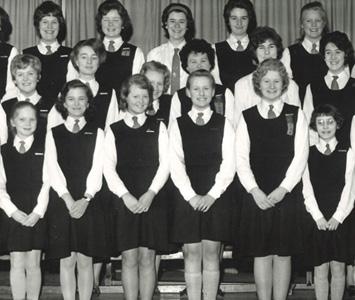
“She looks eighteen” is your remark, When asked, “How old is Jenny Clarke?”
So tall and neat and so mature, “Eighteen of course!” we’re all quite sure.
Her three-inch heels click down the street, So confident are those slim feet. Her gay, new skirt goes with a swing, Just slightly flared – the latest thing. Her sheep-skin jacket is so warm, No shoulders bent to spoil its charm. With lipstick, powder, she’s no square, And crowning all her bouffant hair.
But what was that I heard you say: “Eighteen?” Not she – fourteen today!
S.K.BEAUMONT,SUNRISE
Dawn; The first few streaks of light Stretch across the black sky of night. Then the birds come With the orb of the sun And another day is born.
Sunrise; Pale pink fringes edge each cloud And song-birds voice their joys aloud. The rays become brighter And the dark sky lighter As a yellow hue grows o’er the skies.
E.A.SHEPHERD, Upper VStretching out on the horizon, Silhouetted against an ice-blue sky, Its contours moulding into highland, Lies a blue-grey land. –
A silver-threaded river forms a barrier. A wide expanse of water Dividing our foreground from the horizon. Multi-coloured rooftops speckle our shore, Creeping outwards towards green fields Velvet-like and barren. Engine-smoke weaves through the Houses, continually billowing. Cars and vehicles weave and wind Their way through the country lanes, Like mirrors in the reflected sun. The green fields appear larger, And larger. -
Trees in their winter beauty Appear closer. Their arms wave in the breeze And arch out across the scene. Nature is alive in harmony. But this serenity and beauty is no picture. It is the view from our form room window.
J.BEST, Upper V
WE HAVE THREE CATS, THEY FLY LIKE BATS, THEY CLIMB THE TREES, AND PLAY WITH BEES.
SERAPHINA, A RUSSIAN BLUE, GREEN EYES OF A LUSTROUS HUE, WHIP-LIKE TAIL AND SILVER SHOES, INDOOR PLANTS SHE ALWAYS CHEWS. CINNAMON’S FROM A WARMER CLIME, OF ANCIENT EGYPT IN OLDEN TIME, HARE-LIKE, WITH DARK LINE DOWN HER SPINE, A MISCHIEF-MAKER ALL THE TIME.
RANEE IS A BURMESE CAT, SHE REALLY IS A LITTLE FAT, SHE KNOWS THE HOT SPOTS ROUND THE HOUSE, AND CATCHES EVERY WAYWARD MOUSE.
OUR TRILOGY IS NOW COMPLETE. THEY SEEM TO EAT A LOT OF MEAT, BUT DECORATIVE THEY SURELY ARE, AND HAVE ADMIRERS NEAR AND FAR.
R.H.KING, LOWER IV.
This is the tale of Peter Pan, Who didn’t want to become a man. He would fly around at night, With Tinker Bell, his fairy light.
He had a little shadow, too, And round about with him it flew, But one dark night right off it came. “Wendy, please sew it on again?”
Soon after that they flew away: Said Wendy, “What will mother say?”
With Michael, John and Tinker Bell too, To the Neverlands, for a year they flew.
G.S.JONES, Form I
The waves come bounding over the shore, Retreating and rushing back once more. Foaming, rushing, diving, leaping, While, above, the sea-gulls are screeching.
Pebbles are thrust against large stones. The break waters rock with creaks and groans. Crashing, bounding, once more retreating, While, above, the sea-gulls are screeching.
J.CLARK, Upper III
Red lines, blue lines, green and black, What’s the blob there in the back? Square ones, round ones, ups and downs, Long things, short things, big long gowns.
Blobs and blotches, stripes and pegs, Legs and faces shaped like eggs, Mouths and noses, things like posies, Thumbs and fingers, even “toeses”.
Hair and arms encased in boxes, Triangles, squares and heads of foxes, I know it’s only modern art, Picasso’s pals, scratched by his dart.
But give me scenes of field and hill To dream on till I’ve had my fill, For never can I quite decide, Whether I, or they, or Nature lied.
M.SPRUIT, Lower III
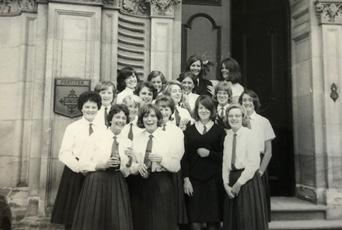
Malet Lambert we were to play
At hockey on this Saturday. We set off on the ’bus to Hull All very cheerful – no one dull, But in the Town, to our surprise, We saw before our very eyes Our rivals in this hockey match, The Swanland ’bus about to catch. Discussion followed then between Our hockey teams, who were so keen. In Hull it was arranged to play, So we continued on our way To Malet Lambert hockey pitch Where we arrived without a hitch. The match began – excitement great Although it was a little late. We tried so hard – our rivals won The game concluded at 6-1. Refreshments we were asked to take, And hoped to have a piece of cake, But in the school we were confused And could not find the room they used. But at last we were united With the team, and were delighted. Success this day was not for us, But as we hailed the homeward ’bus, We knew we would recall this game With smiles and laughter, just the same.
A.BREWER, Upper IV.
MABEL
MABEL, MABEL, WAS NOT ABLE, TO DO HER SUMS OR LEARN HER TABLE, SHE WENT TO BED, AND STOOD ON HER HEAD, AND THAT’S THE END OF UNABLE MABEL.
H.J. ATKIN, GROUP V.
Life contains joy and sorrow, Boredom of the present leads to hope for tomorrow. Life now is more complex than ever before, Every moment opens a different door.
Life for me contains anticipation Whether disputes will be settled between nation and nation, Whether the day will finally come When pleasures are shared among many and not among some.
Life consists of light and dark, Scenery gentle and scenery stark. Within it you enter through a series of doors, And climb from the lowest to the highest of floors.
All life now seems corrupt and crude, When reflected through a bitter mood; A white man on his prejudice bent Dislikes another of darker pigment. Will it all one day become more sweet? A day when none will starve down any street. A day when sequel after sequel, Tells that each to another is equal.
C.M. AUTON, Upper V.
Pretty violet wake Now the snow has gone Now the water flows And the daisy grows. Here comes the Spring! And the birds are on the wing And I will sing a song of Spring.
S. DIN, Group IV.
If I were Queen of Outer Space A rocket I would fly, I’d zip and zoom and dive and boom And watch the world go by.
The view with glee I’d spy and see, Romantic rivers blue; Volcanoes belching fire and rock, All bathed in coloured hue.
Cities nestled in the folds Of mountains tall and broad; Linked by silver railway lines Man’s old and ancient road.
Perhaps when I returned to earth More grateful I would be. I’d never realized, living there, What wealth surrounded me.
K. JONES, Lower IV.
We met beside the bookstall To catch the ten-past train; We were hoping for good weather But of course it had to rain. Our feet adorned in climbing boots And rucksacks on our backs, We climbed into the carriage, Threw our luggage on the racks And we were off …
We passed countless level crossings With gates across the lines, And fields, and lakes, and horses, And factory-towns, and mines. But we left all this behind us And alighted from the train Into wild and peaceful country Which was newly washed by rain, And we were free …
We were free from smoky chimneys And from dull routine and grime. It was not for very long But then with freedom, what is time? We slept beneath the stars that night, Used heather for our beds, Thinking not of busy town life But of birds and flowers instead. And we were happy.
My cat is an aristocrat, With eyes of purest green, And dainty little pointed tongue Which helps to keep him clean.
An animal of unknown age Although his lives are nine. His origin we know of, He comes from a regal line.
He does not deign to look for mice But sits all day supreme, With a most benign expression Like a cat who’s licked the cream.
We hope to keep him many years For fond of him we are, And every night you hear our call, “Come in Shang-ri-la.”
J. OPPEL, Upper IV.
Ten little Tranby girls standing in a line, One got an order mark and then there were nine.
Nine little Tranby girls got to school late, One missed prayers and then there were eight.
Eight little Tranby girls all aged eleven, One passed the eleven-plus and then there were seven. Seven little Tranby girls doing high kicks, One turned a somersault and then there were six.
Six little Tranby girls, learning to dive, One did a ‘bellyflop’ and then there were five. Five little Tranby girls queuing up for more, One slipped and broke her plate and then there were four.
Four little Tranby girls all playing “he”, One got caught and then there were three.
Three little Tranby girls, one of them was new, Couldn’t find her way about and then there were two. Two little Tranby girls with homework to be done, One watched television and then there was one. One little Tranby girl is left to tell this tale, She’s got exams next week. We hope she doesn’t fail.
N. JENKIN, Upper III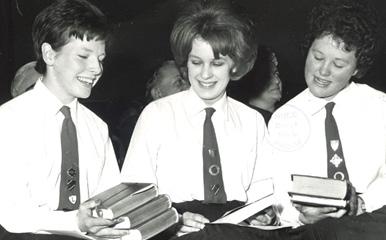
The shore’s shifting sand shuddered beneath the shock, Rasping, sucking, sifting, The white surf blown, thrown in the wind, Scurrying, whirling, whistling. Glistening gulls black-wing-tipped crying, Shrieking, hungry, haunting. The topaz-frosted sun slowly dying, Ebbing, shimmering, sinking; And the breakers pounding from the far horizon, Swelling, crashing, foaming. The sharp air, knife-like, Shivering, cutting, chilling.
Life is an undergrowth of eternal nettles, Death represents the dock leaves which take away the sting. Life surprises, amazes, but rarely fulfils, Ambitions dissolve into a blank sheet of despair.
When we tire of life we fear death, We swing from one grasping extreme to another Like a swinging pendulum, Our life is balanced by the delicate pinpoints of destiny. The current of destiny draws us under, Until we clutch at the straw of hope. Life’s whirlpool confuses us, Her wave saturates our very being and drowns our souls.
The border between joy and despair is frail, And like the waves they tend to overlap. We divulge the means but forget the end, And we, the self-stinging nettles, grow in profusion.
Galloping, galloping over the plains, A streaking black stallion without any reins, Shadows around us and night drawing near, But onward I journey without any fear.
Up over mountains, Down into valleys, Over the sands, And circle the chalets, Down country lanes and through many a dell, You lovely black stallion, I’m under your spell.
Stars in the sky and the moon shining bright, The day has quite turned into magical night, Owls are out hunting, the mice running home, The city ahead, no more will I roam.
AMANDA J. BAILEY, Lower IIIWhen I was at the seaside, I met a little bee, I said “Hello”, politely, But the bee stung me.
So I was very cross Because I’d been polite, And all the little bee did Was to give me a bite.
So next time that I see him I don’t know what I’ll do. Perhaps I think I’ll try to Hit him with my shoe.
But how will I hit him? He’s sure to fly away, I think I’d better leave it, Until another day.
THE SHEPHERD’S FIRE-SMOKE RISES TO THE SULLEN SCUDDING CLOUDS THAT GLOWER IN THE EAST, MAKING THE LAMBS SEEK MOCK SAFETY UNDER THEIR MOTHERS’ FLEECES, AND THE DELAY BIDS THE SKY FAREWELL, WHILST NATURE TRIES TO REST.
BUT NO, FOR IN THE HAWTHORN COPSE, COAT LACED WITH MOCKING RAIN, NOSTRILS ALERT AND INSTINCT AND HUNGER STIRRING IN HER, A SHARP-FACED VIXEN LIES SCHEMING, WATCHING, SNIFFING THE AIR, FOR NATURE NEVER RESTS.
THE SUN DROWNS THE LAND IN A FLOOD OF BLOOD-RED HAPPINESS, AND THROWS UP SALVAGED SCRAPS OF TORN FLEECE, BUT WASHES AWAY THOSE TELL-TALE GOUTS OF RED-TRANSIENT TRACES. BUT LIFE GOES ON FOR NATURE NEVER RESTS.
ANN MAPPLEBECK, UPPER VI.
(With apologies to Walter de la Mare and to Miss Webster.)
“Is there anybody there?” said Miss Webster, Opening the form room door, And the girls in the cupboard held their breath, As her shadow crossed the floor. And a ruler fell off the shelf, Above Miss Webster’s head, And she looked around the room again a second time, “Is there anybody there?” she said. But no-one answered to Miss Webster, No head from the cupboard emerged, And looked into her brown eyes, As she stood, perplexed and disturbed. But only a pair of breathless girls, Who were meant to be outside, Stood terrified in the cupboard and listened To that voice which had caused them to hide. Stood shaking with laughter in the cupboard, And leaning against the wall, Hearkening in an air, stirred and shaken, By the Geography mistress’s call. And she felt in her heart suspicion, Their stillness answering her cry, And a girl moved, stretching a cramped arm, Feeling she wanted to die, For she suddenly called in a loud voice, even Louder, and shouted, “Hark!
If you’re in there and don’t come out at once, You’ll be given an order mark.”
Never the least stir made the listeners, Though every word she spake Fell echoing through the shadowiness of the cupboard To the two girls, in at break.
Ay, they heard her shutting the door, And turning to the next form room, So the two girls crept quietly out again, When the sound of her heels was gone.
SALLY C. GUBBINS, Upper VA.Considering we were in a school party we were surprisingly free, When we went to Switzerland this winter to skee. We rose every day at eight in the morning Yorning;
We ate our breakfast dreaming of bed While spreading Swiss jam on our rather stale bred. And when we dressed up in our ski-boots and our socks and our sweaters and our gloves, we appeared Very wiared; But at least in this way we managed not to freeze When we fell off our skeeze.

Our instructor came up through the snow and the damp, Looking so healthy and brown we suspected he’d been using a sun-ray lamp. And you should see the horse-drawn sleighs we rode in In Adelbodin.
In the evenings we felt we had money to burn And so spent it all in the “Alte Tavurn”. We would dance with a boy who was charming and kind Only to find, He spoke French Not to menchIon Italian, and German and Spanish and Russian and Greek and every other language under the sun Except wun English -
The ability to converse being our only unrequited wish. But, after saying goodbye To our friends in the hye Swiss village, we came again Back to the rain
And the work and the prep and the essays and the rule Of Schule.
SALLY C. GUBBINS, Lower VI.
All burning eyes, and snarl and hiss and spit, Fearsome claws and dagger teeth, With belly close to ground he stalks his hapless prey. As I approach a shadow streaks away, And the wild cat vanishes as swiftly as he came.
Limpid golden eyes, small black nose, Velvet feet, surely no claws hiding here, I sink my fingers in her thick soft fur, House cat nestles on my knee and purrs contentedly.
BRIDGET JORNA, Lower IV.
I OWN A LITTLE NERVOUS DOG, WHOSE HAIR IS VERY LONG, HER NAME IS HOPEBRO FAIRY, WE BOUGHT HER FOR A SONG.
SHE CAME FROM GOOD OLD IRELAND, HER BROTHER’S BEEN TO CRUFTS, BUT NOW WE LET HER HAIR GROW LONG, IN UNRULY TUFTS.
WHEN WE GO ON HOLIDAY, FAIRY GOES TO BOARD, CARE SHE DOES NOT LACK, BUT I THINK SHE REALLY IS GLAD TO SEE US BACK.
SARA E. PRIESTLEY,‘Adelboden’,
A robin on the window ledge, A shadowy drift beneath the hedge, My brother with a home-made sledge, It’s snowing!
Grown-ups never understand
The cold north wind does not abate, The expert does a figure eight, While on the ice I try to skate, It’s freezing!
The things that children do. For instance, if I played with mud, There would be a to-do.
It’s wet and dirty in the town, The snow and frost soon turn to brown, I snuggle in my eiderdown, It’s winter!
Form-room. Late afternoon. Air thick And stifling. Warm, weighty peace, and a soft tide Of shuffling. The liquid squirt of a fountain Pen, filling. There are pupils sprawled untidily, Hands in their hair, Propped up limply just like dead men In a nightmare.
“Go and wash your hands,” they’d say, And “Go and brush your dress.” Really anyone would think It was a dreadful mess.
THE MOLE Have you ever seen a mole? They have black and shiny coats. They live in a little hole, And they can’t row boats.
And if I found a puddle Where I’d love to splash about, A grown-up would be sure to come And say “Quick, child, come out.”
Their tiny paws are rather pink, They cannot climb the smallest trees, They often stop to have a blink, They really loathe the bees. Up above the birds are singing, Down below the mole is crawling. In the church tower bells are ringing, To the ground the leaves are falling.
In broken bits, odd whispers sift Away to nothing. The faces muse, watch the drift Of a sleepy smile. A hot wasp dances exasperated, Punctuated By a buzz of nasal vulgarities, Up the hot glass Of the high window. Cries of the tennis Players travel Lazily upwards … car wheels grind On the gravel. (Caught up in quietness Like a fly among great webs, Comes the low sound of a pen Scratching strange little men Half-deformed, and toppling edifices Down the margins of rough notes.)
And once I climbed a nice big tree And nearly reached the top, But then a grown-up came and said “Come down or you will drop.”
But I don’t care for grown-ups’ chatter, I’ll have fun with other things, Now I think I’ll go and play With Mummy’s diamond rings.
The winter trees are tall and bare, Not many animals are awake. Mole is safe and snug down there, Ice is frozen on the lake.
SARAH HODGKINS, Form I.
H.J. WOOD, Form II
A bell screams; battering the soft stillness Like a cock-crow at dawn. A slow shuffling of papers together; People stretch, and then yawn. In a cloudy murmur of half-hearted talk They drain out through the door. A cold draught wafts in. Bright reflections Slide over wall and floor.
The sound of laughter on the stairs: Emptiness, then … How many others left it to Emptiness too? Ghosts of carved names in mellow wood Inhabit this too –
Drift in gold sunbeams slanting through Settling chalk dust. Oh, let us cling to fleeting time, for we must Become ghosts too.
Winter has gone and with it the cold, Fresh is the air but the sun shines like gold; Daffodils bloom in a sparkling array, While frisky new lambs both frolic and play.
Animals wake from their long winter sleeps, A March hare through meadows takes hops, bounds and leaps; The hills are transformed into glorious hues, Primroses, crocuses, violets, to choose.
Birds are returning from a sunnier clime, Blissfully chirping sweet tunes all the time. Diligent wives their Spring-cleanings begin, And all find delight in the beauties of Spring.
BATS ARE VERY QUEER THINGS, THEY LOOK LIKE A MOUSE ON WINGS. UPSIDE DOWN THEY SLEEP ALL DAY, AT NIGHT THEY GO UPON THEIR WAY.
THEIR LITTLE CLAWS ARE SPECIALLY MADE, FOR HANGING WHEN THE NIGHT WILL FADE. THEN IN THE NIGHT THEY GO AWAY, HUNTING FOR FOOD BEFORE THE DAY.
THEIR NAMES ARE HORSE-SHOE, LONG-EARED, SMALL, SOME OF THEIR EARS ARE FAR TOO TALL. FOR LITTLE THINGS THEY’RE VERY QUICK, THEY CAN FLY BEFORE THE CLOCK WILL TICK.
SARAH DIN, FORM II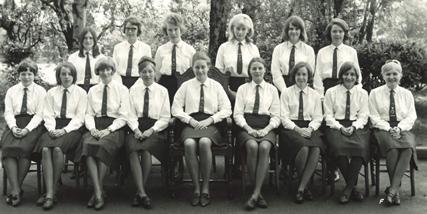
I arose so early that morning that only the Distinctions between black and white could be made out.
No colours.
I walked carefully through the dripping grass where Only nocturnal eyes perceived my presence. No people.
I felt neither dampness nor chill as I stepped, My eyes skywards, facing towards the east, Waiting for dawn.
Later, grey streaks appeared in the sullen heaven And watery colours leaked into the landscape of greys, Sketching the dawn.
Then came the mystic moment when the mighty sun Lifted itself above the horizon, cracking open the night. And the dawn broke.
Real shades of greens, browns and golds filled the Surface of the fruitful earth in its late summer. And the birds sang.
A strip of land. Ordinary land, with a few trees and houses, Happy and contented people. Then war came; Raising its hideous head over happiness; Crushing its heavy fist on to happiness; Trampling happiness into the mire.
No happiness
But a dull resentment against every body and thing. Blank faces with eyes of fear Look out upon a wasted world.
John Smith is commended for bravery
In the “London Gazette”, Congratulated by fashionable people. Someone, somewhere dies or loses a home, And no one knows Even what his name was.
People caught between powers. Powers that destroy or create At the flick of a finger. Power wielded by a merciless hand, And the common person suffers: Is driven from hearth and home By strangers. Drifting wearily from Town to town. No purpose in life, No one to help, Helpless. Nothing but what is on his back; No use to anyone.
Many an animal’s found in the Zoo, Lions and tigers and elephants too, You go in through a wrought iron door, Crowned with the crest of a lion’s paw.
In the Aquarium lots of fish Are swimming around, swish swish swish; Cod and haddock, halibut and plaice Are swimming in this huge glass case.
Next we come to the lion’s cage He is roaring, in a rage. I hope his keeper can keep him there Or else there really will be a scare!
Scrap, the cheetah, is next on the list, How he hates the Autumn mist, He is gentle, and he is kind, He has a very peaceful mind!
Camel, seal and tiger, Giraffe and kangaroo. Oh, what a treat it is To be taken to the Zoo!
SARA PRIESTLEY, Lower III“Lighten our darkness,” all the people pray, And God sent owl and bat and creatures weird and strange. He sent the wolf the lonely plains to range And said, “These are my servants too. Oh man, you have the day.”
“Lighten our darkness,” all the people pray, And God sent hyena, jackal howling through the night, Sent ghosts and shadows, fancies of man’s fright And said, “Stay humble, fearful in the dark. Oh man, you have the day.”
“Lighten our darkness,” still the people pray, And all feared God except the nightingale Who pierced the dark with bubbling, joyous tale, “Fear not, but trust for God is good. Oh man, he sends the day.”
BRIDGET JORNA, Upper IV.
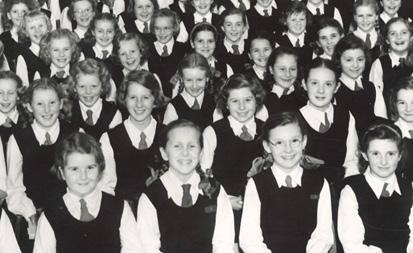
A SUDDEN SHIVER OF COLOUR, AND THE PEACOCK STRUTS AWAY DOWN THE WIDE LAWN, AS PROUD AS A KING SHOWS OFF A NEW SUIT. HE TURNS AND SLOWLY STRUTS BACK.
HIS ROBE OF FEATHERS, LIKE A DRUGGED ARTIST’S DREAM, TRAILS HEAVILY BEHIND HIM; AS A KING PRECEDES HIS ROYAL TRAIN. WITH HEAD HELD HIGH AND HEART OF LEAD, UNDER THE WEIGHT OF OFFICE THAT ACCOMPANIES REGALIA.
KATHERINE HARROP-GRIFFITHS, UPPER IVThe sun is weak among the clouds, Raindrops fall steadily down. Pale colours merge. A delicate bow adorns the heavens, Stretching over the countryside, Leaping trees and isolated farms. Red and orange meet and mix, One end in the river, the other in the trees. A curve of splendid colour, The rain stops, the colour weakens And the Beauty fades.
JANE HODGKINS, Lower IVThis is about a girl called Lee Who sat at the foot of an old Elm tree. She sang a song to me, me, me, About the fishes in the sea.
On her way she met a gnome, Who said, “Now you’re going to Rome.” With a flick of his fingers, a twitch of his nose, Up, up in the air she rose. She cried aloud in panic and pain “Gnome, gnome, take me home again!”
Then she woke and found it was a dream. Things are not always what they seem.
NICOLA WINETROUBE, Form I.
Distorted shadows flit through my brain With frightening brevity as I try in vain to recall Another moment when this nomadic word of farewell At once, friendly, bitter, grieving; seldom religious, Has caused such wandering thought in me.
“Goodbye Sir.”
My last teacher at the tiny village school Has hard, brown, tobacco-scented hands and As they clasp mine his warm, dark eyes are smiling Through tortoise-shell glasses, stuck with yellowing sellotape. He said my friend had writing like spiders, and My page is suddenly crawling with spiders, happy, industrious, Sad spiders. His wife is fat and cheerful and she dies and I grieve; but not for her, My tears are for him, because he is poor and unselfish And for God, because He seems unjust. I want to discard formality, to fling my arms around His wrinkled neck and tell him that I can’t forget him, That I’ll come back soon and help him clean out The fish-tank, just like we used to on Fridays … But all I say is: “Goodbye Sir,” And move on to bid “farewell” to another.
“Goodbye Mother,” We quarrelled, and I won; but in my mind only. Her still, mute figure acknowledges rightful victory. Over me. The pregnant silence becomes unbearable, Hysterical. So I stoop to petty childishness and slam the door, Outside. I stand shunning tears of anger and sorrow, Hating both of us, yet groping for courage and humility to apologise. Both desert me so I walk away.
“It’s a good thing you know, premature independence, You don’t need your parents, only think you do.”
A theory of some anonymous shadow dances across my mind Like skeleton leaves in an audacious Spring breeze. It makes me laugh and feel wordly. Then the tears start again, and I walk back. The tension has disappeared and a false cheerfulness reigns But not supreme. Soon, in the veiled future, we will laugh at the incident; Until it happens again.
L. GOSTELOW, Lower VI.The classroom stood empty In unnatural peace. I crept in silently, Six inches tall. There were hideous desks In everlasting rows, A piano, huge and motionless Above my head. Far in the distance, the church bells chimed. It was Sunday noon. Pictures hanging on the walls Stared at me with realistic eyes. I felt a shiver run down my spine, My back ached, My neck grew stiff Looking up at towering things. I thought it would be fun To be so small. Instead, I felt lost and bewildered Overpowered by every object, This was a dream. Reality is better after all.
NICOLA WINETROUBE, Form II.
She went to school on Wednesday, And fell down on her leg, And went to Matron while at play, And this is what she said, “You will not walk again today, You silly little Meg, But try to be a little gay, Or I shall break your leg.”
HAZEL IDDON, Upper III.
THE IVY WAS ENTANGLED ROUND THE BRANCHES OF THE OAK, AND IN THE CORNER WAS A MOUND FROM WHICH A PALL OF SMOKE ROSE UP TO WHERE THE GARDENER FROWNED, AND THEN HE TURNED AND SPOKE.
HE WAS TALKING TO A MALE THRUSH WHO PERCHED UPON THE WALL, AND FROM A TREE THAT WAS SO LUSH HIS MATE LET OUT A CALL. SUDDENLY IN A GREAT BIG RUSH, HE WENT WITH WORM AND ALL.
Who was this girl who sat Opposite me, Her shoulders hunched And bleak sorrow in her eyes? What was she? Why her suppressed grief?
Who was this girl who watched Without moving Country and town flash by? A train can be a lonely place. I am nothing, I can not help her, She does not notice me.
What is her sorrow? Has she lost someone she loves? Is it death? I do not know I can not know There is nothing I can do, And she will never know Her sorrow is mine too.
Higher, faster: up and up, Yet however high the highest be, However often reached, Time stops. And helplessly suspended in the night, The fair below is as far removed As the moon above.
As quickly as the moment’s gained It’s lost. Suddenly bright lights, deafening sounds Surge forth, sink back, Leave mind and body dizzy and confused.
The ground swoops up, And falls away. Seconds, stretched in flight to endless hours, Permit clear thoughts. I see the milling ants below, The bent old man above.
Soaring through the black, Swinging to and fro, Advancing, retreating, with exhilarated cry. Faces – enough to fill a football ground –Gaze up, But cannot share my joy.
My feet once more planted On the litter-strewn ground, Wary, Of the now still earth, Heart still pounding with pendulum motion, I move with the rhythm Of my glorious flight.
JANE HODGKINS, Upper IV.
SEE THE SEA HORSES, WHITE CURLY MANES, I’M RIDING THE HORSES, GUESSING THEIR NAMES.
DOWN TO THEIR STABLES, DEEP IN THE SEA, FISHES LIKE JEWELS, FLASHING BY ME.
SHEENA FULLERTON, FORM I.
A CHERRY BLOSSOM TREEBorn to be free. Little buds on bare branches, Growing to be strong,
To live a life of freedom, Blowing in the April breeze. The buds bursting under the gentle rays of the sun. The breeze dies down.
The tree blooms into blossom, Adding colour to the starkness of the lane. All the trees form an archway above my head. The wind whips up, becoming stronger, Starting to make the trees bend under the weight of it. The blossom falls down like confetti at a wedding, Covering the lane with a soft cushion, With the leaves acting as a blanket.
The weather gets colder and the tree enters its long sleep for the winter, Only waking when the gentle sun-rays flicker on the branches.
KATHRYN O. GOSTELOW, Lower V.
Lying in bed, Nothing to do, Keep on sneezing, Got the ’flu.
Doctor is coming, With a bag Full of pills, Bottles of medicine To cure all my ills.
I’m out of bed now, Lots and lots to do, Running about, I’ve got rid of the ’flu!
JANEALLMARK, Form II.

I CAN NEVER TELL WHAT AGONY, WHAT SORROW HE FELT; LOOKING ON.
ORDINARY LAND NOW – NOTHING MAKING IT SPECIAL, ALTHOUGH IT WAS. SILENCE. FOR THERE MEN FELL FOR THE PEACE OF TODAY. CURSES AND CRIES WERE UTTERED FOR ME. HIS BEST FRIEND, TOO, DIED. SHARING EVERYTHING BUT ONE. SILENCE. AS THE TEARS FALL SOFTLY AND SLOWLY I WONDER:AM I REALLY WORTH IT?
JANE A. B. FEWLASS, LOWER V.
The lesser fire-breathing Paucus Is very, very fierce, Its slimy hide is odious, And its teeth mortals pierce.
The lesser fire-breathing Paucus Is friendly to the Gods, But it’s an enemy of mortals And strings them up on rods.
The lesser fire-breathing Paucus Has very gory habits, For breakfast, lunch and dinner, It eats ‘human rarebits’.*
The lesser fire-breathing Paucus Is employed by Jupiter, To guard the Mount Olympus ’Gainst mortal intruders.
The lesser fire-breathing Paucus Is Juno’s favourite pet, She laughs to see it devour The humans who are pests.
The lesser fire-breathing Paucus Is a very fearsome sight, Its foaming mouth is warty, And it moans while it’s in flight. *humans on toast
ANNE E. MACMAHON, Lower IV.
May 1969. Photographer unknown.
The fog swirled around me, My rain-kissed hair clung … As if inclined to stifle the dream of warmth, beauty and sun! The busy clerk hurried along to catch the ’bus that I stood on; Everyone hurried.
The fog swirled around me like a shielding blanket …
Shielding myself and the population, People shout! Exasperated! At whom? … At one another. Who was the culprit? To whom did they shout? The fog! The fog that swirled around me.
The fog swirled around me, like a large mysterious cocoon, I groped my way through its silken folds … Searching for some landmark, a guide to identify this barren land; A light? A window? An open door? And home!
ELIZABETH JACKSON, Upper IV.
“Oh, where are you going to my pretty maid?” “I’m going to school, Sir,” she said. “With a coat and a scarf and a satchel crammed tight And a beret plonked flat on my head.”
“What do you do there my pretty maid, For you look so pretty and gay?” “I cannot think why, Sir,” she said, with a frown, “Because it’s all work and no play.”
“What are the dinners like my pretty maid?” And with a groan came her reply, “They’re not too bad as I’m used to them now But the first time I thought I would die.”
“What are the teachers like my pretty maid?” “They teach us all nonsense and stuff, They’re old and eccentric … but now Sir I think you’ve asked questions enough.”
“Pray why do you ask these questions, kind Sir?” He said, “ ’cause I’m your new head.” She blinked, then she stared and her mouth opened wide, Then she turned on her heels and she fled!
FIONA LOCKING, Upper IV.
Self-portrait by Tessa Wood, Lower VI, published in ‘Aspect’ 1969-71.
One week last year the school was filled With sounds of noisy chatter, We ran along the corridors, For once it didn’t matter.
For we were trying to raise some cash For the ‘Feed the Minds’ campaign, And every lunchtime and at break We’d ply our wares again.
Five Upper had a beauty salon, They even styled our hair, They painted our nails and painted our lips But nobody seemed to care.
Five Lower had football matches, They even played the staff Who, racing round the hockey field, Made everybody laugh.
We gathered pennies in our houses And stretched them in a row, The Prep. put theirs all up the stairs To see how far they’d go.
At the end of a very hectic week When we’d closed our classroom doors, We’d raised one hundred and twenty pounds For a very worthy cause.
FIONA LOCKING, Upper V.
Out of the house, Into the car, Oh, what a rush,
Distance so far. Once in the car, Must settle down. Oh what a noise! Make driver frown. Once into gear, Car moves away, We go up the road
To start a new day. Round all the corners On two wheels we skate, Must hurry up, Cannot be late. Turn up the drive
Towards the school door, Ten miles an hour – mustn’t do more. Out we all jump, Satchels in hand, Ready for school – eager, small band.
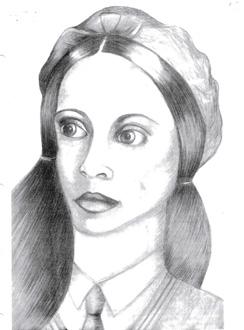
When you go to the shoe shop, Not knowing what to buy, It can be very difficult, And this is the reason why.
There are red shoes and black shoes, And other colours too. There are brown shoes and white shoes, And also there is blue.
There are shoes made of suede, And wet look and leather. There are cool shoes and warm shoes, And shoes for every weather.
When you have tried on All the shoes that you can find, It is so very difficult To make up your mind.
Then you say to the shop assistant, Trying to be polite, “Do you think I could have some shoe polish, To make my old shoes bright?”
PTERODACTYLS WERE FLYING IN THE SKY SO BRIGHT, HOVERING LIKE HAWKS TRYING TO SCARE THE ANIMALS ON EARTH WITH ALL THEIR MIGHT.
LIKE BATS IN THE SKY, SWISHING, SLUSHING IN THE MERES BELOW HALF REPTILE AND HALF BIRD, SHARP TEETH AND FEATHERS. THE NIGHT WORE ON, ONLY THE PTERODACTYLS STIRRED.
SALLY NEEDHAM, FORM I.
A SNAIL SLID ALONG TO MY FRONT DOOR, SEE HIS TRAIL THERE ON THE FLOOR, NOT VERY FAST, JUST GLIDING ALONG, LISTENING TO THE BIRDS’ TWITTERING SONG, HIS SHELL ON HIS BACK AND OFF HE GOES, HE NEVER STUMBLES FOR HE HAS NO TOES, SWIFTLY AND SOFTLY HE MAKES HIS WAY, INTO THE MIDST OF THE SUN-SETTING DAY.
DIANE CHERRY, LOWER III.
A winged arrow, Streaking towards its target, Claims its price And returns to its young, Faithful to the end.
A face as Oriental And ancient as the East, Eyes as piercing and ruthless As the mid-day sun Beating upon the Sahara Desert.
Fur that is ink-splattered paper Smudged and blemished, Yet as sleek as a jet In the distant sky.
Feet that skim Yet never touch The everlasting plains Of eternity.
JILL FEWLASS, Upper IV.
First there came the age of Reptiles, You could see lakes for thousands of miles, Where the brainless brontosaurus Wallowed in the mud without much fuss.
Next the brown mammoth filled the world, He had hair that really curled, He had a friend the woolly rhinoceros Who looked forward to seeing the hippopotamus.
PHILIPPA RYDER, Form I
To hold our breath And wait for death?
TESSA WOOD, Lower VI.
The darkness has gone. Now is born a new morn of white winter pageant Made of silver and diamond fragments. Every tree, bush or weed, Has now no leaf, fruit or seed. It was as if each plant had found a different dress maker.
The river is now a glass mirror with water vapour. Nothing stirs except two dark figures walking And they are quietly talking. They are enchanted in the morning frost and snow,
MARY CLUBLEY, Lower IV.
THE SCHOOLGIRL’S LAMENT (AFTER READING ‘THE HOUSEWIFE’S LAMENT’)
ONE DAY I WAS WALKING, I HEARD A COMPLAINING, AND SAW A POOR SCHOOL GIRL, FORLORN IN THE RAIN. THE TEARS ON HER FACE LEFT A TRACK OF DARK STAINING, SHE SOBBED HER WAY HOME DOWN THE LONG DREARY LANE.
“O LIFE IS A TOIL, AND LOVE IS A TROUBLE, SCHOOL DAYS ARE BORING AND TEACHERS ARE CROSS.
ESSAYS ARE TIRESOME AND HISTORY IS RUBBLE, IN FIVE MORE YEARS I’LL BECOME MY OWN BOSS.”
CONTROLLING HER SOBS IN A VALIANT FASHION, WHILST STAGGERING ALONG WITH THE WEIGHT OF HER BOOKS, HER ANGER, DEPRESSION, FRUSTRATION AND PASSION, INFLAMED WHEN I TOLD HER SHE’D SPOIL HER GOOD LOOKS.
“O LIFE IS A TOIL, AND LOVE IS A TROUBLE, SCHOOL DAYS ARE BORING AND TEACHERS ARE CROSS.
ESSAYS ARE TIRESOME AND HISTORY IS RUBBLE, IN FIVE MORE YEARS I’LL BECOME MY OWN BOSS.”
LYNDA OXBORROW, UPPER IV.
THE BUS JOURNEYThe same daily routine … The bus journey. The regular people come in regular step To the bus stop, then stand in the rain, Their umbrellas shielding them From drips from the hairdresser’s roof. Wet, splattered legs Steam and smoulder on the bus. Cigarettes and pipes come out And relief spreads over the people’s faces. Some doze and miss their stop –*! * . . . . * !! and the conductor blames them For staying out the night before. All the secretaries at the Hedon Road factories Depart, clutching their magazines and handbags. Mysterious people, occupations unknown, Move silently and get off on Holderness Road. Then comes our stop. Our eyes widen as we greet the city, Another day has just dawned on our sleepy faces. People rush about, late for work, With anxious faces and deep-set frowns. We stumble down the bus stairs, Wincing at the cold air outside. Then another bus journey after that –And the routine repeats at another bus stop.
‘GOAL!’ was the roar from the jubilant crowd, Arms aloft the scorer bowed. The other side were tired and jaded After five minutes their zest had faded! They dragged their feet and gasped for breath, Another goal would bring their death.
‘HURRAH!’ was the roar from the jubilant crowd, Yelling hard and twice as loud. The final whistle brought relief, Cries of joy and sighs of grief. The cup was presented by the ‘Queen’ To the triumphant winning team.
This was no hockey match at Wembley, But a soccer match at Tranby. The fifth form challenged the noble staff To a game of football, for a laugh. The profits from this worthy joke Went to ‘Hampers’ for the needy folk.
Miss Thompson was an elegant ‘Queen’, Mrs Battarbee, manager of their team, Mrs Attwood, the ‘experienced’ referee, The fifth form cooks produced the tea. Our grateful thanks to all concerned For the sixteen pounds that we have earned.
R.R., A.K., J.W., J.R., C.G., H.G., (Sporting Correspondents Football Department).
IF I WERE AN EAGLE SOARING SO HIGH, I WOULD FEEL ABSOLUTE KING OF THE SKY, ROLLING IN THE WIND LIKE A SHIP TOSSED AT SEA, THERE IS NO BIRD ALIVE AS GREAT AS ME.
SWOOPING DOWN TO THE ROCKS TO CATCH MY PREY, CLASPED IN MY TALONS UP AND AWAY, BACK TO MY EYRIE SO PRIVATE AND HIGH, YES, NOW I KNOW I AM KING OF THE SKY.
ALISON DREVER, UPPER III.
PEOPLE VAGUE BEYOND THE FOG THEY ARE ONLY SHADOWS ELUSIVE GHOSTS THAT FLUTTER GREY FORMS THAT FLOAT AND FOLD AND FADE FRIENDS THAT LEFT WHO COULD HAVE STAYED IN MEMORY THEY NESTLE GREY PHANTOMS FLOATING FAR AWAY.
THE DISTANCE IS SO FAR BETWEEN YOU AND ME. THE FOG IS SO DEEP. THE SILENCE IS SO FULL. FALLING HEAVY LIKE THE SOUND OF SLEEP BREATHING SLOW AND I WILL NEVER LET YOU KNOW AND YOU WILL GREYLY COME AND GO AND I WILL NEVER LET YOU KNOW.
The interform netball we won, and the prize Which caused our opponents to open their eyes, Other abilities noticed in us –Non-working, non-thinking, Non-eating, non-drinking, No fuss. Immaculate uniform, Hat on the head. Manners most charming –What more can be said? ANON.
It’s funny how you get used to things, I think to myself. I’m used to the noise the tank in the cupboard makes. To a child it might be a giant snoring in the night. To me it’s a lulling, soothing sound And makes me tired, very tired, But something inside me won’t let me sleep. Every time my eyelids droop, they quickly open again As if I would be punished if I slept … And as I think of these things, Though I don’t know it, I am away, I’ve left my thoughts behind. All that I take with me are my happy, sleepy dreams …
LUCINDA FEWLASS, Form II.
Illustration by Alyson Rose, published in ‘Aspect’ 1969-71
A tombstone stands crumbling and rotting In the recesses of my mind. Although ivy has encircled most of the stone, If I probe deeper into my memories I can see a small inscription Which bears the words, ‘Here lies Keltie our dog’, And I realise with bitterness that I have forgotten her.
They said she was deformed, But although her body was small and rather plump Her white breast contrasted with her black, silky coat, And her brown, tender paws made her beautiful. She was a very personal dog, Full of feeling, And a kind of companion, when I felt depressed or miserable. But I didn’t realise then, that I would forget her.
In her declining years she was blind and deaf But she could smell her way around the house. And she would come and greet any home-comer –Wagging her tail and hind quarters in friendly unison. She lived to be six months older than my eleven-year old sister. But now, after seven years of decaying matter She is forgotten.
Beauty is a stillness of form, Beauty is a new-born foal Lying quietly in the warm sunshine, So naïve to life, So pure, So innocent. Is beauty so difficult to reach?
ALYSON ROSE, Lower V.
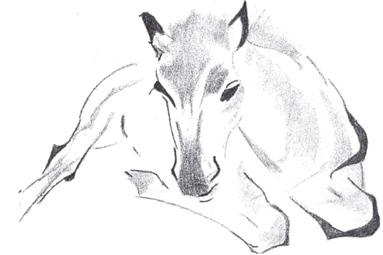
I WALKED INTO HER WORLD HER ONLY WORLD SHE SAT IN THE OLD ARMCHAIR LOOKING FRAIL ON HER MANTELSHELF WERE PHOTOS AND BELOW WERE ASHES FROM YEARS AGO GRADUALLY THEY WOULD DISAPPEAR LIKE MURIEL.
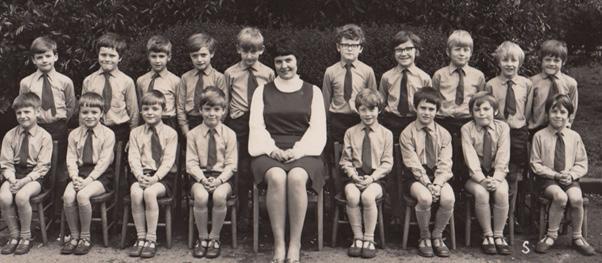
IN A CHILDISH MANNER SHE TALKS ABOUT HER CAT, PRICE OF TEA AND MEMORIES SHE NEVER KNOWS ABOUT OUR WORLD NOW SHE SMILES THE CLOCK TICKS MONOTONOUSLY I SAY GOODBYE AND LEAVE THE WORLD OF MURIEL.
MARY BRIDGMAN, FORM LOWER V.
Our little gerbil is as frisky as can be, He liked to be at school, but he ran away you see. He jumped about a lot, he ate like a tiny kangaroo, His teeth are sharp and could bite you.
Our gerbil is mischievous, and cuddly and soft, I’m sad he had to leave us, but he still lives at Tranby Croft
Under the stairs with the wild mice too, He’s just like a little kangaroo.
GOLDIE
We have a little hamster, He is very, very small, And when he goes to sleep, He curls up in a ball. And one day when he was asleep in his airy cage, He thought he could smell lovely food: honey, oats and sage. He is very, very nice and soft, I think he likes to live at Tranby Croft.
Grown-ups never understand
The things that children do. For instance, if I played with mud, There would be a to-do. “Go and wash your hands,” they’d say, And “Go and brush your dress.” Really anyone would think It was a dreadful mess.
And if I found a puddle Where I’d love to splash about, A grown-up would be sure to come And say “Quick, child, come out.”
The old tramp hobbles with a limp in his pace, Cold in his hands, his feet and his face; Going to the library or any warm place, I know it’s Jim – by his footsteps.
And once I climbed a nice big tree And nearly reached the top, But then a grown-up came and said “Come down or you will drop.”
He steps with the left, and then he drags The right foot over the endless flags. His over-long trousers are all in rags, They’ve got that way through his footsteps.
But I don’t care for grown-ups’ chatter, I’ll have fun with other things, Now I think I’ll go and play With Mummy’s diamond rings.
Past all the houses, across the road, This poor old man has no fixed abode. Troubles and woes are his only load, He’s all alone with his footsteps.
H.J. WOOD, Form II
I see some children on the swings, I see some most peculiar things. I see a kitten on a wall, And a dog someone’s trying to call. A cardigan that someone forgot, And part of a tree trunk somebody chopped, A little girl, eating nuts. And some very little huts. Why look at this fish, with quite a long tail, A very big fish, with teeth like a whale. Look at this person on the slide, Having a most extraordinary ride, First on his tummy and then on his back, Making the ducklings go, “Quack, quack, quack, quack.” Oh look at the time, I’ll run to the gate, In the hope that I won’t be too late. What a joy it would be to live in the park And not have to go home when it gets dark.
We wonder, but we do not know Whether it is the colour of snow. It could be black, it could be grey, It might change colour every day.
It could be solid or even airy, Maybe it’s a devil or a bad fairy, It might be from earth or outer space, Our spirit of the fireplace.
It might have been this funny thing That made Miss Thompson’s arm go ping, That made Mrs. Attwood break her nose, Susan her foot, but not her toes.
Susan, alas, broke her finger, Perhaps it’s because she tends to linger Around that dirty, funny space, Our one and only fireplace.
Mrs. Findlay – now here is a case –Hovered around the fireplace, And, of course, she broke her arm, Then after that did no more harm.
And last of all, but not the least, We broke the tiresome fireplace, To see the thing that lived behind, And meet the creature we would find.
Later one sunny afternoon, There came another blow of doom, The spirit who, we thought, was dead, Bumped Susan nicely on the head.
Susan’s head now started bleeding, Much attention was it needing, At the hospital in the city She had five stitches. What a pity!
But now we think he’s gone away, “For good I hope,” we often say. Should it come back, we’ll give it a race From Hull High School to Outer Space!
AMANDA FRANK, Upper III.
Green is the holly, White the mistletoe, Red is the berry, White is the snow.
Brown the good earth Feeds Robin merry, Red is the Robin Red as the berry.
Holly and Robin Red, green and brown. Brown is the earth In country or town.
Tinsel and glitter, Red, green and white, Back to the good earth Snow in the night.
Christmas is colour, Colour is gay Red, green and white, But brown for each day.
FRANCES M. FULLERTON, Upper V.
STARLING
THE GREEN IRIDESCENCE IS REMINISCENT OF HIS FOREIGN RELATIVES’ SPARKLING BRILLIANCE. NOW, UNENVYING AND SELF-CONFIDENT, HE STRUTS PATHETICALLY AND SPLASHES IN THE POND AND SNATCHES FOR A RIND IN THE FROZEN SNOW.
LIVING ON CHARITY: UNPITIED AND UNPITYING.
HE NEITHER WORRIES WHERE THE NEXT MEAL WILL COME FROM, NOR CURSES GOD FOR OFFSPRING LOST IN BITING COLD; BUT BRISKLY SETS ABOUT THE TASK OF LIFE. WITHOUT COMPLAINT: WITHOUT BITTERNESS.
JANE MASON, UPPER V.
I oft have dreamed Of the terrible cat In the evil land of Toomanyeyes. Here trees are moving, Creeping things, Which glare in the dark. Each notch is an eye, Which looks at you With a frightening, fixed stare, And a cat, the cat Creeps over the sky, And each mottled hair Is a terrible eye, Which stares at you, Glares at you, And burns the dark night hot. The cat glides on With well-practised ease And fades in the dark Of a starless night. Not a ripple, nor murmur From the mercury sea As she shines in the night With a phosphorus light. Then a buzzing noise Fills the ears, Getting louder and louder Until all fears Disappear in the waves Of the ultimate sound, And I awake to A noisy, A buzzing, A ringing, A chiming, Alarm clock.
SARAH CONNELL-SMITH, Upper IV.Purple, the colour of Kings. Kingfisher blue enhanced By feathers and sunlight. Smoothed and moulded together By the hands of a sculptor. Majestic supremacy Flowing across the emerald grass.
A mirage in the water Seen with half open eyes. It deigns to stoop and drink Of the perfumed water. Enwoven in the air, Sweet notes of a flute Entwine with the drowsiness And the aroma of Mediaeval time.
A courtyard of echoes and history, A world belonging to no one. Ancient walls feel the past With the presence of a creature Of such nobility and deity.
Listen, the light left with you, Dusk fell, blotted trees and cloud-shapes, Leaving only dull oppression in the small hot room. Quiet now, the record ended, Failed to eject, bumping faint, spasmodic protest. Downstairs – amazing how the household rituals run on, Grilling bacon, they too will hear trains jolt On the riverside line, Will gloomily deduce the imminence of rain.
Two cigarettes smoulder to nothing, I watch But may draw no parallels.
I have oiled my defence against the obvious And learned the transience of detachment!
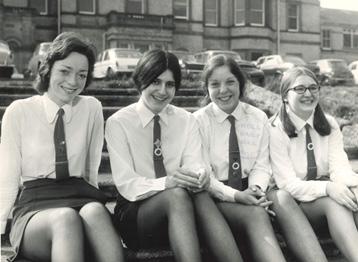
IN BED LATE AT NIGHT SUDDEN BUMP IS A FRIGHT, A BANG ON THE WINDOW, A CREAK ON THE FLOOR, THE HOOT OF AN OWL IN THE BIG TREE NEXT DOOR, THE NOISE OF A FOGHORN I THOUGHT WAS A GHOST, THESE ARE THE SOUNDS THAT SCARE ME THE MOST.
SUSANNAH RICHARDSON, FORM II.
I dislike spiders very much
Even at the very first touch, Spiders creeping down the hall Looking at you from the wall, Spiders, spiders everywhere Even floating through the air. Spiders always creep and crawl Peep through crannies in the wall.
FRANCES FORSTER, Lower III.
They hurl themselves towards me, Their features blurred
Grown-ups never understand
The things that children do. For instance, if I played with mud, There would be a to-do.
JEALOUSY
I am a grand piano. Majestically I stand Beautifully polished Longing for someone’s hands.
I do wish somebody would play with me!
“Go and wash your hands,” they’d say, And “Go and brush your dress.”
Really anyone would think It was a dreadful mess.
By an invisible mask of obscurity. I let out a silent scream. Turning, I find myself Struggling against an unseen force, A powerful centre of magnetism That uses its perpetual energy To draw me gradually to its Infernal torture of non-being. The pressure put upon me to fight this ruling force
And if I found a puddle Where I’d love to splash about, A grown-up would be sure to come And say “Quick, child, come out.”
I stand here in my corner Being as patient as I can. I can’t stand this much longer For I think I’m very grand.
I do wish somebody would play with me!
Everyone plays with that upright thing Which was bought for a song. The tune it makes is deafening, It keeps on going wrong.
And once I climbed a nice big tree And nearly reached the top, But then a grown-up came and said “Come down or you will drop.”
Tears at my every limb, Claws at my brain, But still I continue my ceaseless labour. My legs are being extracted from the remainder of my body. The tentacles of this power probe my mind. Then the swirling mists surround me. The power draws me nearer. Escape is impossible. Then still. The pressure is released.
I do wish somebody would play with me! Then suddenly, what do I hear? Another piano very near? Oh no! It’s that tiny recorder, Thank goodness its noise is not any louder.
But I don’t care for grown-ups’ chatter, I’ll have fun with other things, Now I think I’ll go and play With Mummy’s diamond rings.
I do wish somebody would play with me!
I wonder what I have done wrong For I was not bought for a song. I’m very expensive, so I’ve been told, Could it be because I’m so old?
I do wish somebody would play with me! Please!
If I was a magician I’ll tell you what I’d do. I’d turn people into cats and dogs And red and white rabbits too. But when the Martians came to raid, There’s nothing much to do, But fire my cats and dogs at them And they’d turn red and blue. But then I’d put up barriers To stop them shooting us, And then I’d fire some guns at them And make them into stew.
GAVIN DALTON, Boys’Of all the flowers that one may see, The dandelion is for me, More than just an ugly weed, But something that I feel would need A little kindness, a little thought, Instead of thinking that we ought To tear it up by its roots, And prevent it from growing further shoots.
SUSAN JOHNSON, Upper III.We like friends, When school ends, Off we run To have some fun.
We love our Mums, And some like sums, Ponies and horses too.
Songs at mikes, Rides on bikes, And outings to the Zoo.
We all like jokes, Some don’t like cokes, But ices and lollies we gobble. We race at the sports, Like tennis on courts, When tired home we hobble.
At Haltemprice pool We can keep nice and cool And we all like to go to the park. We hate wasps and flies Telling tales – telling lies. But we know that we All Love School!
Form I, a class poem.
Oh time when trees in fiery fury dressed
In Autumn winds will shed their hot array
And don the cool grey mists of Winter, lest They fail to mourn sweet Summer’s dying day. Then clad in dew the hedgerows sparkle fresh
As when in Spring’s embrace they yielded blooms. But now the cobwebs form their lacy mesh O’er twigs as ghostly spinners spin with looms. The mist comes down and joy is lost ’till Spring
When sun will heat the frozen earth again, And soft warm hands will rub the frozen wing And free and set in flight all love; ’till when Blue Summer’s endless holidays are gone And mist makes the grey sky and earth as one.
SARAH CONNELL-SMITH, Lower VI.RED IS FOR RUBIES, THE NICEST I’VE SEEN. ORANGE FOR THE LEAVES IN AUTUMN INSTEAD OF BEING GREEN.
YELLOW IS FOR DAFFODILS, A PRETTY, PRETTY FLOWER.
GREEN IS FOR THE LIME THAT IS VERY, VERY SOUR.
BLUE IS FOR SKIES, INDIGO FOR BUTTERFLIES. FINALLY VIOLETS. BRING IN THE LILACS.
ALEXANDRA MYERS, FORM 1This morning we awoke to Fairyland Christmas- tide
A new white world glistening and sparkling, Unmarked by human foot except upon the road Where early wakers dare to tread or drive And spoil this perfect chilly fantasy. The silent stillness is broken only by the ‘plop’ Of dollops of snow falling from branches, Tired of hanging on to their involuntary perch. Then snowflakes are let loose from the sky And pirouette down like flustered fairies. We hurriedly pull on our warmest clothes To frolic among these playful feathers.
PHILIPPA RYDER, Upper IV.
IF I COULD BE WHAT I WANTED
I SHOULD LIKE TO BE A TREE TALL AND STRAIGHT AS COULD BE WITH COLOURED LEAVES AND GRACEFUL BRANCHES IN WHICH THE BIRDS PERFORM THEIR DANCES.
YES, I’D LIKE TO BE A TREE WITH NO-ONE ELSE AS TALL AS ME.
STEPHANIEGARDINER, LOWER IV.
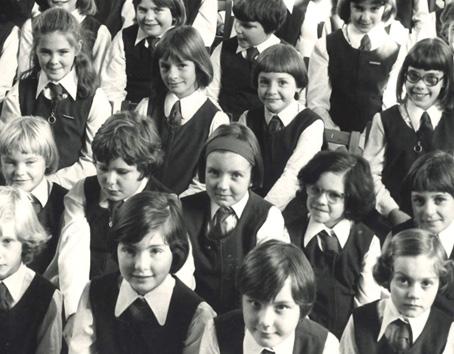
Yes! I saw the Winter in the wood. He was a horse like untouched snow. His eyes were like fires that never grow warm. He ran on legs as white and thin as icicles, His mane and tail glistened like clear ice.
Yes! I saw the Winter in the wood. He snorted like a thunder clap, His hard ice hooves sent lightning off the snowy ground. The breath he breathed froze on the majestic trees. And he held his head high when he wailed an icy moan.
Yes! I have seen the Winter in the wood. He galloped off leaving his crystal clear sign, Had been and gone like Jack Frost, But I will never forget the Winter Horse. Oh yes! I have seen the Winter in the wood.
ANNA BATES, Lower III P.
The long, green, silky centipede Doesn’t travel at much of a speed. His body is very slightly scaly, And he crawls along like a baby.
He has a hundred tiny legs, Very like stubby pegs. He is very thin and slim, He keeps his hairy coat so trim.
He nibbles at his juicy leaves, Like a mouse at a piece of cheese. Finally he has a rest, He’s really not such a pest!
THE UNICORN OF MYTH AND LEGEND WITH HORN OF SILVER, PEARL AND GOLD, WHITE AS THE FOAM ON CRESTING SEA WAVE, IS PURE AND TRUE, BRAVE AND BOLD.
HIS MANE AND TAIL ARE OF SPUN SILK AS GOLD AS THE GOLD OF AN AUTUMN SUNRISE, SILK-LIKE THE COBWEBS IN THE DUSK A GLINT OF KINDNESS IN HIS EYES.
HIS NOSTRILS FLARING, EYES ARE GLARING, HE PAWS THE GROUND WITH IMPATIENT HOOVES, REARS AND GALLOPS, WITH EASE HE MOVES.
SUSANNAH RICHARDSON, UPPER III.
The remaining bricks stand insecure, Warmed by the golden rays of the sun. Green moss and lichen climb the walls. Those rooms that are left are vacant; Shutters hang by rusty hinges, Glass is shattered, towers derelict.
The sun turns to sunset; The cloisters become tall, Silent, shadows against the sky; The garden stands untouched Sprinkled with crumbled stone. All that remains of a life past, dead and gone, deceased.
Illustration by Sally Webster, published in ‘Script’ 1976-77.
In an inner London district Where the streets are badly paved There stalks a shabby tabby Who is woefully depraved; His habits are revolting His behaviour without shame. He lacks redeeming features And Rasputin is his name.
Chorus Rasputin, Rasputin (Known for short as Rasp) His conduct and his attitude Would make a convict gasp. He is known by all the people As the sure cat lover’s test For if you can love Rasputin Then you must love all the rest.
About his worst activities I dare not really tell.
If he behaves respectably You know he is unwell. He knows not of his namesake In Russia’s darkest days, But if he did he’d think his name The highest form of praise.
Illustration by Jane Milligan, published in ‘Script’ 1976-77
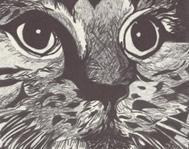

This majestic creature sits upon his rocky throne on the mountain. Glancing o’er his territory that falls away beneath him; To the west of the noble bird the fireball sinks behind a tired horizon; As all lies untouched he glances with a cold unblinking stare To the valley that sinks before him.
The rusty coloured rocks and sands are amber in the quiet evening air, And the rough tufty grasses are outlined by the slowly sinking sun; Then his sharp eye is cast upon a lizard adventuring neath the rocks. Unaware of this onlooker it cautiously ventures from its den, But then without a moment’s delay in a flash is invisible to sight.
He shifts as the air grows cooler and lifts his crooked hand to a further sturdy crag, He stands alone preening his fine feathers with his great arched beak. Silhouetted, stark, magnificent he stands in his eyrie. As a King upon his court his golden eye surveys his forlorn kingdom. His glorious crest like a crown upon his regal head.
Then suddenly without warning something captures this cunning wise eye, And in the near darkness his senses tell of a poacher on his land; This was the moment: his prey lay at his feet; Like a thunderbolt he falls from his lair in the sky, And drops to a level as he swoops into the night.
At a splendid height he soars, above this defenceless catch, But aware of his hunter the victim runs in terror, as the bird dives before him. The violent swift rush of wings sears the evening air, His strength alone conveyed in his vast fingered wings; The master of terror wheels through the night as the chase of life is on.
SUZY HAYWARD, Lower V.
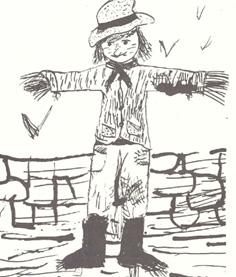
I am a scarecrow, a scraggy old thing, I’m held on a post by an old piece of string.
My body is straw in an old sack cloth bag. And my clothes are made up of old things that all sag. My arms are two brush handles with gloves on the ends, If the wind blows too hard there’s a big creak and I bend! My head is a turnip with two eyes and a nose; My hat’s an old trilby and all full of holes.
Illustration by Gillian Scott, published in ‘Script’ 1976-77
I like playing Monopoly, And Starsky and Hutch, The fabulous detective game, I often touch.
I like eating shortbread, And chocs even more, I like playing cricket, And not being sore.
MARTIN GORDON-KERR, Preparatory.Lying down upon the beach With my suntan lotion right in reach. Looking upon the dark blue sky Seeing seagulls flying high. The sea is glittering with its blue coloured dye It makes me wonder why The sun is so high; The golden coloured sand Trickles through my hand; The busy bees can now be seen Collecting pollen for their queen.
CLARE MILNE, Form II.
Only the brave survive; Only the brave will emerge alive And kicking; Scratch of busy nibs on paper, Frustrated, rushing for want of Time. It’s so hard to think. The atmosphere is tense with thought, Inspiration hanging from a silver thread Waiting to be broken.
I’ve forgotten Everything I ever knew. Once I saw the paper, Education flew Through the window. Surely it’s a nightmare And I’ll wake up soon,
Away from nasty, probing questions Dreamed up by evil and alien beings From another world
To torment us.
RACHAEL ARNETT, Lower VI.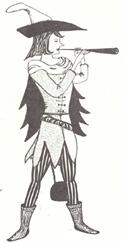
Tranby Croft’s in Anlaby, By famous Hessle town. The River Humber deep and wide Washes its way through Humberside, A pleasanter spot you never spied. It happened on this very day July tenth, nineteen-seventy-eight.
All the little Junior girls, With shining eyes and well brushed curls And bulging lunch packs on their backs Set off from Tranby Croft. They left the school at nine o-clock In beret red and blue check frock And sandal brown and clean white sock … (Their berets soon came off).
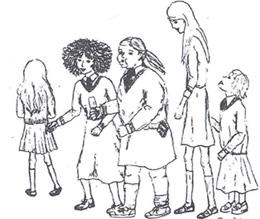
They sped along the motorway, To Helmsley where they spent the day, Touring the ancient castle there, To Rievaulx, scene of many a prayer, They made their merry way.
Big girls, small girls, thin girls, brawny girls, Brown curls, black curls, fair curls, tawny curls, Slow, slow walkers, endless talkers, Cousins, sisters and best friends, Followed the teachers round all the bends.
When they returned, all money spent, Socks not as clean as when they went, By all the parents they were met. It was a day they won’t forget. Hair was not so tidy now, Faces not so clean, But all were smiling broadly, A very happy scene.
FORM 1A
The dew had already fallen; Giving the world a silver sheen. I walked amidst the cold, clear air As if in a mysterious dream.
The strange grey shadows of the trees Silhouetted against the sky, Gave a weird and eerie feeling That morning time was nigh.
LORNA VICKERS, Lower V.
TREES IN THE WINTER ARE COVERED WITH SNOW.
TREES IN THE SUMMER BLOOM AND GROW.
TREES IN AUTUMN LOSE THEIR LEAVES.
Illustration by Pippa Ryder, published in ‘Script’ 1977-78.
TREES IN THE SPRING ARE FULL OF BEES.
THOMAS HOLTBY, PREPARATORY.
The sparrow is a happy bird who chirps merrily all day, He plays with his friends at games that sparrows like to play!
The peacock is a show bird who proudly struts around, It’s not that he prefers walking – he’s just clumsy off the ground. The cuckoo is a lazy bird with a very persistent call; He lets others do his work as he sits upon a wall!
The robin is a friendly bird with a brightly coloured chest, He lets us humans see it but the female wears a vest!
But my favourite’s the blackbird who has a pretty song, Which in his smart black suit he sings all the evening long!
ALISON HUNTER, Lower IV.
NIGHT’S DARK CLOAK ENVELOPS THE GARDEN. THE BIRDS SLOWLY DISAPPEAR OUT OF THE TREES AND BUSHES.
THE YAWNING FLOWERS DROOP THEIR HEADS. STILLNESS ENTRANCES THE GARDEN, WHILE EVERYTHING SLEEPS UNTIL DAWN.
NICOLA PASSMORE, UPPER IV
When I’m digging in the garden A robin comes to me, His small red breast puffed out with pride, A cheeky bird to see. He hops around the earth I turn, His sharp eyes seeking food, The whole year through he seems to keep A perky, happy mood. I take a rest; he quickly flies To perch upon my spade. I stand in peace and so enjoy The friendship I have made.
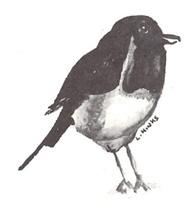
I looked down and released my shimmering flakes
They floated, swirling, to the ground Landing, covering dips and bumps Flakes of sugar, icing and caster. People think I don’t exist People think I’m just some flakes People don’t know where I live With all my friends up in the clouds. My friends are Summer, Spring and Autumn Taking turns to make the seasons. I am a girl with a deep white veil A veil of flakes and gloves of frost Legs of wind and a heart of ice My name is Winter.
JOANNA MOSES, Lower IIIDIllustration by
Richardson, published in ‘As We Were’ 1978-80
She is always around
In her flaming coat of red, yellow and orange. As she flies around, Hissing and spitting, Sparks drop down From behind her. They drift down To earth, Setting houses, villages, towns, And even cities on fire. She stays to watch, Glowing with pleasure At the sight of the terrified people Trying to get away. But their efforts are all in vain, She sends down more sparks And surrounds everything with flames. She floats around the sky Pleased with her work, Pleased at the sight Of people burning alive. Now her work is done And she returns to hell.
PHILIPPA CAPES, LIIISFantasies, and figments of idle imagination, Searching lost crevices of meandering time; Reminiscing, shimmering, gliding, glimmering Through still worlds of tranquil ecstasy, Slipping, sliding, gently twining, Trading memories for fiction in the mind’s eye.
NICOLA PASSMORE, Upper V.
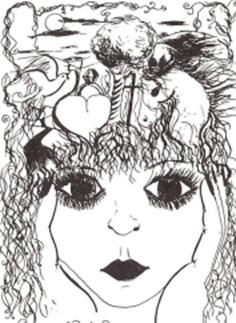
There’s a little grey squirrel at Tranby Croft. He’s ever so little and ever so soft. In Spring and Summer he runs on the ground. But in the cold Winter he’s never around.
CLARE ROXBURGH, Preparatory Group 4
As I look at the window, At the patterns that are there From last night’s frost, I see figures and animals Coming into my vision. Brave knights, in shining armour, Rescuing fair ladies imprisoned in high towers, And then an Ice palace, With delicate turrets And the window frames Which glisten and shine like glass. The lacey patterns then change Into strange animals of myth, Unicorns, with their horns That would pierce a man’s heart. And I turn my attention to a hunt, With the hounds Chasing a now frightened and weary fox. And then my vision is broken, As the sun comes out And melts the glistening ice That formed the pictures on my window.
It takes an incredibly High I.Q. to write A right haiku.
KATE GODDARD, Lower VI.
BREATH BURBLING, CLOUDING, FROST LIKE LACE, BRITTLE AND DELICATE, DAZZLING. ICICLES HANGING, POINTING, SHARP EYES GLEAMING. HARSH, COLD EYES. I HAVE NO RESISTANCE, BUT IN THE DISTANCE I SEE HER, THE QUEEN OF ICE. SHE PIERCES MY HEART AND I TURN TO RUN. SHE STRIKES ME AND I AM AN ICICLE, RADIANT, BLUE. GLITTERING, GLISTENING, I AM LIKE GLASS, I AM ONE OF MANY PIECES LIKE A CHANDELIER. I TRY TO WHISPER BUT IN VAIN, THE PALE SUN SHINES ON ME AND I AM GONE.
RACHEL SCANLAN, FORM LIIIS.
I wander’d lonely as a cloud, Through the never-ending pages Of Geoffrey Chaucer, Keats and Wordsworth, And all those lucky daffodils, ‘Beside the lake beneath the trees’; Oh, why couldn’t I just have been a breeze!
HELEN OYSTON, Upper IV.ROAST POTATOES, CREAMED POTATOES, BOILED POTATOES, CHIPS!
SAUTÉ POTATOES, BAKED POTATOES, DIRTY POTATOES, CRISPS!
SOUFFLÉ POTATOES, SALTY POTATOES, CROQUETTE POTATOES, SMASH!
CRISPY POTATOES, JACKET POTATOES, GREEN POTATOES, MASH!
RISSOLE POTATOES, CHEESEY POTATOES, PIPED POTATOES, TOSSED!
HOT POTATOES, COLD POTATOES, PEPPERY POTATOES, ROLLED!
NEW POTATOES, OLD POTATOES, SCHOOL POTATOES, YUCK!
CAROLINE AYRE, UPPER III.
As slowly up the steps I climb, Taking them carefully one at a time, My heart’s in my mouth as the ground disappears; Now I am realizing all my worst fears, There’s people behind me, I can’t turn back now, I’ve got to go through with this madness somehow. Now I’ve come to the board and my mind’s gone quite blank As I watch a youth diving who’s weedy and lank; But now it’s my turn and my mind’s in a whirl. The water’s not glistening but dull like a pearl. I go to the edge of the board and then stop; I give a quick jump, a quick skip, a quick hop, But the board is too wet; as I slip off the end I see all my family my funeral attend; Now I’m reaching the water and drop with a splash, On the bottom of the pool I almost crash; I rise to the surface and gasping for breath Think I escaped almost certain death.
JANE FAIREST, Upper III.
My life is like a nightmare, Troubled waters under the bridge, Climbing up for ever. Trying to reach that ridge.
The ridge of happiness
Where no trouble comes my way, No evil thoughts can reach me Until my final day.
The final day of life, Waters calm beneath the bridge, My final day of lightness Before falling off that ridge.
CLAIRE GORDON, Upper IV.
Quiet footsteps, a floorboard’s creak; While the whole of the family are fast asleep A dark-clad figure quietly moves around, His kingdom is night and knows no bounds. Gasping for breath, Kate awakes and hears The sound of heavy breathing, a sound she fears; She gets up slowly and with a soft tread Moves to her parents’ bedroom – are they dead? Who is the intruder? Are we to see?
Kate lets out a gasp; oh, please let us see! Who is it? Who is it? Has he credentials? Oh, please let us see! No; break for commercials.
Mrs. Smith in her washer now uses BOLD, Henry eats Minced Morsels and does as he’s told. The Fiat Strada’s made by robots, and as we can see There’s nothing like Ford for reliability.
When, oh when, can we get back to the film? No, I didn’t mean that sort, not a Kodak film! I don’t care if it’s cheap, or printed overnight; Not another daft commercial! Now it’s Ultrabrite. I could scream, I could scream – when will they end? If I have to watch another it’ll drive me round the bend.
SNOW IS FALLING Snow is falling In crunchy crystal shapes, Fluffy and silent. It moles into the ground, Like a white veil it spreads on to the earth, It dresses the ground in white It glitters in the evening sun. Fantastic, mysterious and still, Like a cloud of dust Bursting from a silver brim Of a grey cloud.
I’m a field mouse in my hole And the sights I see are magnificent, The barley dances in the wind In its golden glistening dress, And the beams from the sun Beat down like golden glowing showers. The honey bees are buzzing All around the cherry red poppies, I see swifts and swallows Flying low to the ground, Like aeroplanes flying over golden clouds. I look into the sky, it never seems to end, It looks like a field With the clouds as sheep And the golden sun as a shepherd. I watch the lady birds In their red spotted jackets, Like little red beams of sun. It’s a lovely life for a field mouse.
SAMANTHA HOLMES, FORM LIIIS Poem which was placed second in the Original Poetry class atHull Festival.
THE LISTENERS?
‘IS THERE ANYBODY THERE?’ SAID THE POSTMAN. KNOCKING ON THE SHABBY DOOR; AND HIS VAN IN THE SILENCE USED UP PETROL BOUGHT FROM THE GARAGE NEXT DOOR. BUT NO-ONE CAME TO ANSWER THE POSTMAN, NO HEAD LEANED OVER THE SILL; THEY ALL KNEW THEY HAD NO MONEY AND THE POST BROUGHT THE ELECTRICITY BILL.
ALISON TIMPERLEY, LOWER V.
OH CAN YOU FEEL THE WIND AS IT GALLOPS UP THE SHINGLE WITH AN EDGE OF SALT THAT STINGS AS YOU TASTE THE GRIT IT BRINGS? HOW I FEEL MY SENSES MINGLE AS A SWEEP OF COLD THAT TINGLES
WHILE THE SEAS’ ECHOES RING WITH A HOWLING GLEE THAT SINGS; BELLS OF WHITE HORSES JINGLE. HOW THE WAVES CRASH TO THE SAND BRINGING SMOOTHLY GROUNDED STONES! I CAN SEE THE SHIPS WHO DARE TO BRAVE THE WATERS’ WILDEST ZONES, WHILE THE HAILSTONES CUT THE AIR, OF THIS SCENE, SO BLEAK AND BARE.
HILARY FROGGATT, UPPER IV HULL FAIRAs we push down Walton Street, the crowd starts to swell, All the fun of the fair in the air I can smell, The aroma of toffee apples, candy floss and chips, The sense of excitement I can taste on my lips. ‘Chance a penny, win a pound, Throw the ball as the cans go round,’ The showman shouts. The children scream, There’s the blare of music, the hiss of steam. ‘Hold my hand, grip the rail,’
As round and round we fly or sail; I feel the night wind through my hair, And all the magic of the fair.
After fish and chips, popcorn, a chocolate dream, A hot dog, lemonade and pink ice cream, Ten rides, that noise, that acrid smell, I’m going home now – I don’t feel well.
It’s the week before Christmas, Profits rising high, Debenham’s Father Christmas with A glint in his glass eye. Christmas cake and carols, But I can nowhere see Any deep down feelings In the bustle around me. What’s the point of Christmas? It seems to pass us by; We look up and say, ‘How pretty!’ To the bright star in the sky. The town was cold and lonely, The broken lights were dull, The tattered trees and tinsel Reflected stagnant Hull. I went into a coffee bar
And someone smiled at me, A nun with such a happy face That shone and reached to me. For she was happy, I could see; She loved Christmas; Shouldn’t we?
SUSANNAH RICHARDSON, Lower V.The time drags on; Minutes seem like hours; I don’t want to be cooped-up inside But out among the flowers. The lessons all mingle To one vast length of time, My mind is all a muddle.
Oh! When will the day be mine?
SALLY HICK, Lower IV
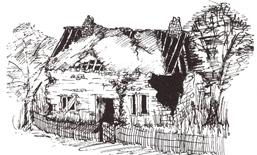
Crumbling walls, a vacant terrace, Trellis gate swung wide, Gaping door and blinkered windows, Secrets hid inside. Roses straggling, tangling, choking, Shaky steps and eaves, Jigsaw pathway leads to nowhere, Limply laced with leaves.
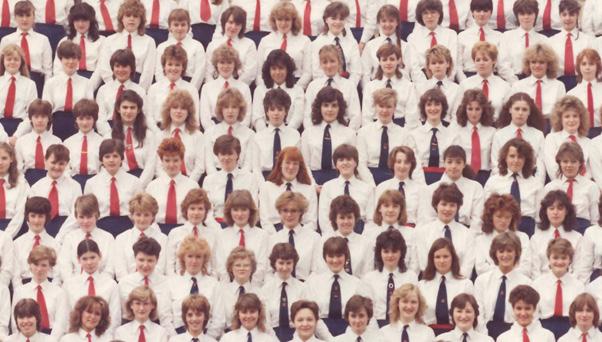
Trudging down the garden, bucket trailing behind, Mum said my job was blackberries to find; Getting to the bushes, looking all around, Find a clump of blackberries hanging near the ground. Eat one first, flesh purple, juicy, sweet, Now look, the briars are tangled round my feet. Better put the next one in my can Or I’ll never have enough for a pan of jam. Quickly they fall with a steady ping; That’s not right, they shouldn’t sing. This one feels riper; I bet it’ll fall with a splosh; Oh dear! It’s going to rain and I haven’t my mackintosh. Trudging up the garden, with a big full can, I can smell the jam cooking in the big brass pan.
Pitter patter, pitter patter, Rain upon the door, But it does not really matter What are wellies for?
Puddles puddles everywhere, I think I’ll need my brolly. Pitter patter, pitter patter, I think rain is jolly.
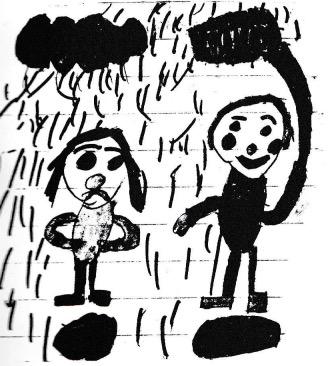
Mr. Snowman, Mr. Snowman, Please don’t melt away! How I wish the sun would go Somewhere else to play!
Mr. Snowman, Mr. Snowman, If you melt away, Who will I play with every day?
CAROLINE WILKINSON, IIB.Today the sun is shining bright, In the sky this yellow light. Shining down upon us all Like a shiny yellow ball.
In the park the children play, On the swings they swing all day. Other people in the park, Playing tennis until it’s dark.
On hot days like today We call round friends to come and play. In the garden a picnic tea And watching the buzzing bumble bee.
The red roses in the flower bed, A cap upon my brother’s head. I’m glad it’s in the holidays, As into the sky I gaze.
Children with balloons I see, Looking happy and carefree. Nothing in the world can stop This sunny day that is so hot.
CAROLINE MATHUR, LIIIWA dove in the air is a wish true and fair To a lady with long golden hair. So peaceful it flies, In the blueness of skies, And a branch in its beak for its nest.
Dove of peace in the colour of white, Gentle, quiet, in a world of delight. Flying by windows, Looking for scraps, Searching in gardens for A quick bath perhaps.
KATHRYN DOUTHWAITE, LIIIW.I have eight pounds hidden in my bank, One for my brother for a big toy tank; I have seven pounds underneath a log, One towards a present for my little pup, Tog; I have six pounds for a big ted Lankie, Two for my mother for a pink lace hankie.
Now I have four pounds. Whatever shall I buy? One shall go to Grandpa for a silken tie; I have three pounds. What would Grandma like? Maybe a working basket or a little silver bike; Now I have two pounds, enough I hope, For one shall go to father for a bar of soap; Now I have one pound sitting on my knee, Who else shall I buy for? Well, why not ME!
FOR CHRISTMAS I WANT …
FOR CHRISTMAS I WANT A LOVELY CHINA DOLL.
I WANT A TALKING PARROT, THAT I WILL NAME AS POLL.
I WANT A BIG GREEN CHRISTMAS TREE, I WANT SOME TREASURE, AND A GOLDEN KEY.
I WANT A CHRISTMAS PUDDING TO EAT, I WANT A CRACKER, AND INSIDE A TREAT.
I WANT A FLUFFY GINGER CAT, I WANT A WOOLLY POM-POM HAT.
I WANT TWO REAL RUBY RINGS, I WANT SOME SILVER FAIRY WINGS.
I WANT, FOR THE FIRE, SOME BIG FAT LOGS, I WANT SOME DANISH WOODEN DOGS.
I WANT A SILVER AEROPLANE, I WANT A UNICORN WITH A COLOURED MANE. I WANT A SPLENDID VELVET GOWN, I WANT A BEAUTIFUL SAPPHIRE CROWN.
I WANT A NEW BMX BIKE, I WANT SOME CHOCOLATES, THE KIND I LIKE.
OH! WHAT A WONDERFUL WAY TO LIVE, BUT FOR CHRISTMAS WHAT SHALL I GIVE?
SOFEEN HUSSAIN, LIIIW.
GIVING UP CHOCOLATE HASN’T BEEN EASY. ‘IT’LL DO YOU GOOD,’ MUM CRIED. SO I STUCK TO MY GUNS, HAD NO CHOCKY BUNS AND NOW I’M STARVING INSIDE.
EACH DAY I SAY, ‘HOW LONG TO GO TILL EASTER DAY IS HERE?’
MY MUM SIGHS AND THEN REPLIES, ‘YOU’LL NEVER MAKE IT, DEAR!’
I WISH THE DAY WOULD HURRY UP, I’M GETTING DESPERATE NOW. I JUST CAN’T WAIT UNTIL THAT DATE! TOMORROW! I’VE DONE IT! WOW!
FRANCES WILLS, IIB HILLSIDE RIVER
Golden sunlight breaks on the water, Waking the start of a new day. Wandering sheep on the hillside Far from their shepherds stray.
Mountaineers, tourists and fishermen
Arise from their refreshing sleep, Down to the golden waters, Where fishes and basking sharks keep.
Answer to the cry, The buck and the doe on the hillside, And the skylark up in the sky.
A cooling wind goes through the valley, Through the unbearable heat. The sun is now high in the heavens, And the temperature none can bear.
Sunset at last! The first evening star Brightens up the sky. The river once more is coloured, With an indelible scarlet dye.
There goes a ghost with hands held high, There goes a witch flying by, Now I’m in a rocket going up to the moon, And now I’m floating around in a hot air balloon.
I’m being chased by a big green monster, And now I’m in the claws of a gigantic lobster. Now I’m on a boat in the deep blue sea, And now a man who’s got a knife is chasing me.
And now the sun says that it’s morning, I’m awakened by its beams. The adventures of my night, I’m glad to say, were dreams.
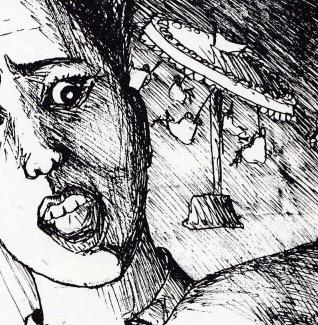
I had a dream the other night. It gave me such an enormous fright. It was all about our famous school After we received a large swimming pool From our lovely Tranby Association And from many a good donation.
The tragedy began on our sports day Where I won the egg race, by the way. All the teachers simply ran riot, While the seniors went unusually quiet.
The nice new swimming pool was close by, Then all the parents began to sigh As the teachers jumped in the deep end. We thought they’d all gone round the bend.
Many dreams come true, I hope this does – do you?
Dreams, dreams are not what they seem. You dream about witches, ghosts, dragons, Washed out at sea then dumped in dark caverns, You dream about cartoons – Laurel and Hardy, About drama and fiction – winning the Derby; You dream about dungeons, all dark and dim; You dream about terror – walls caving in. You dream about rabbits, guinea pigs, cats, Snakes, lizards and squiggly rats. All these things are in our head; ’Till we hear a voice, ‘Wake up, sleepy head’.
When I awake, after a dream, I often can’t remember the theme, Wonder and wonder as I might, I cannot remember about the night.
It would be nice to know what I’d dreamt, Because then I would know what it all meant, It would be nice to know what was the meaning, And then I would know what I was scheming.
They say that dreams come true, But I can’t remember who Was in the dream I had last night, So how will I know that it isn’t right?
On second thoughts I could not bear If my dream should be a nightmare. Perhaps it’s best that my dreams should blind What happens at night in my little mind.
MY FAVOURITE DREAM IS QUITE A SCENE. I DREAM OF RIVERS RUNNING FAST, THE WAVES RUSH UP AS I PASS IN MY LONG RED CANOE, PADDLING FURIOUSLY, THROUGH AND THROUGH, MY HEART BEATS: THUD, THUD. WILL I CRASH AGAINST THOSE DARK BLACK ROCKS, THAT FROM THE RIVER STAND OUT BOLD, OR UNDER WATER HIDE UNTIL THE WAVES LEAP OVER THEM, FAST AND FURIOUSLY SKIMMING BY?
A BIRD ABOVE UTTERS A CRY, THEN I UTTER A SIGH, ‘I’VE MADE IT AT LAST THROUGH THE FAST RUSHING RIVER.’ THE THOUGHT OF RAPIDS MAKES ME SHIVER. NOW I FLOAT BY, LOOKING UP AT THE SKY.
THE RIVER IS QUIET AND CALM, NOT MAD AND ANGRY ANY MORE, SO ON I DRIFT, FLOATING BY THE CREAM-WHITE CLIFFS, ON AND ON I DRIFT, SO SWIFT, SO SILENTLY.
ROSEMARY TURNER, UIVYDreaming is a way of escape. By day or night it’s always there, Either in dark or light. A daydream can carry you out of a boring place To somewhere you’d rather be. Maths can turn into a sandy beach With curling waves breaking on the shore Until reality interrupts, And you’re back in school being bored once more. You’re in trouble again and someone’s droning in your ear; Dream it’s Christmas or another time of year; The snow’s falling and the presents are arriving. But suddenly you’re awake again, To face the punishment you’re being given. If only life could be one long dream, To imagine you’re anywhere you please! But life isn’t like that, the dreams are only short. It’s reality that lasts a lifetime And sometimes dreaming’s a useful resort.
JULIE WARDELL, LVX.By day and by night you inhabit that seat. You’ve nowhere to go and nothing to eat.
Your clothes are ancient, tatty and worn. Your hat is all holes; your trousers are torn.
Your hands are yellow from cigarette stains. You’ve nowhere to shelter from wind or from rain.
Your blankets are newspapers, found in a bin –But they give no warmth, for they’re soggy and thin.
Your face is scarred from old wounds and fights. Memories haunt your dreams through the night.
You’re constantly smoking and drinking gin, To help you forget the dilemma you’re in.
HELEN WILSON, UIVXAN OLD, OLD HOUSE WITH CREAKING DOOR, A RATTLING WINDOW, SQUEAKING FLOOR; A CHILD HUDDLED UP IN AN UPSTAIRS BED, HEARING UNEARTHLY FOOTSTEPS TREAD. THE FADED LEAVES RUSTLE IN A GHOSTLY LAUGH, SOMETHING STALKS UP THE GARDEN PATH –A BLACK CAT WHICH WAILS AND MOANS TO THE MOON CRYING LIKE A HARBINGER OF DOOM.
THE CHILD SHIVERS, EYES SCREWED UP TIGHT, BLOCKING OUT VISIONS OF THINGS IN THE NIGHT, HELD RIGID IN FEAR’S UNYIELDING GRASP, TILL SLEEP STEALS OVER WITH PEACEFUL CLASP.
JANNINE JOBLING, UIVYI SIT AT MY DESK, WITH ALL MY MIGHT, TRYING TO THINK OF SOMETHING TO WRITE, I CONJURE UP IDEAS, BUT THEY DRIFT APART, PLEASE SOMEONE HELP ME.
I BEGAN WITH A GIPSY, AND CHANGED TO A MOUSE, THEN TRIED WITH A FLY AND FINALLY A HOUSE.
MY MIND BEGINS TO WANDER, MY THOUGHTS ARE LED ASTRAY, I’LL NEVER GET IT WRITTEN, I NEED SOME HELP TODAY.
TWO HOURS HAVE PASSED BY, AND STILL I SIT AND THINK, BY THE TIME I GET IT WRITTEN, I’LL HAVE USED UP ALL THE INK.
I JUST DON’T THINK IT’S FAIR, FOR PEOPLE WHO, LIKE ME, TRY SO HARD AND GET NOWHERE, WITH FLIPPIN’ POETRY.
NICOLA JACOBS, UIVYIllustration by Victoria Rowbottom, published in ‘The Crofter’ 1985

The unicorn plunges on the wind; I grip the shimmering silken mane, Riding a whirlpool of frenzied power, As she twists and turns beneath me.
Then with a final, straining leap
We hurtle down passages of time, Wind whipping past with clutching hands, Insistently dragging me from my mount. I scream – a gurgling sound of terror And clutch with flailing hands at nothing, Falling, dropping to oblivion. And then strong teeth clamp on my coat Whisking me back through countless aeons, I sprawl upon the silvered grass, Watch the Unicorn gallop up a moonbeam, Then blink and laugh at my flights of fantasy –’Till I see, entwined between my fingers –A silken strand glowing in the light of the moon.
Here I am floating away, It’s just the same both night and day, I am often bored and tired of life, And I’m all alone, no hope of a wife.
I sometimes wonder and often gaze, Right into the wild and murky haze, And try to see the rest of the world, From my bowl of water that’s always swirled.
But even though my life seems bad, I shouldn’t really be so sad, I’ve a happy owner who’s kind to me, So perhaps being a fish is a good thing to be.
I’m slipping below the line of the living.
I’m fading away where the mists upsurge, Where nothing can keep me well and forgiving In a mathematical problem that’s never been solved Where the boggling mind is yet uninvolved. And the light of light will slowly submerge.
The answer lies beneath everyone’s head But will our brains start to think instead Of being idle, foolish, slight –And will they start to rebel and fight? Can we play for the future and so proceed To forecast our lives and our every need? Or are we blind victims of predestination, To suffer – a present and past generation?
The answer lies beneath everyone’s head But will our brains start thinking instead Of being idle, foolish, slight. Will they rebel and start to fight?
I can’t prejudge what’s unforeseen But those who can see my oncoming scream At life’s declining ruined pleasures; No place to find abundant treasures.
I’m slipping below the line of the living I’m fading away where the mists upsurge, Where nothing can keep me well and forgiving And the light of light will slowly submerge In a mathematical problem that’s never been solved. Where the boggling mind can’t get involved.
FIRST I SAW HER WHEN SHE WAS YOUNGER, SKIPPING AND DANCING AND HIDING FROM THUNDER, THEN I SAW HER GRANDDAD DYING, NO LAUGHTER, NO SINGING, JUST A WHOLE LOT OF CRYING, THEN I SAW LAUGHTER, BRINGING MEMORIES OF SCHOOL, LEARNING AND PLAYING, ACTING THE FOOL, NEXT CAME FRIENDSHIPS AND GOING FOR TEA, SANDWICHES, BISCUITS, FAR TOO MUCH FOR THREE, THEN I REMEMBER HER GETTING A BIKE, HER BROTHER BROKE IT, SO IT WAS HE SHE DISLIKED, THEN SHE HAD A BROKEN ANKLE, PAIN AND SUFFERING, BUT LOTS OF SWEETS TO SAMPLE, SOON CAME THE TIME WHEN SHE TURNED SIXTEEN, CHOCOLATES AND FLOWERS, ALL THE BOYS WERE KEEN, I SAW HER HAVING HER FIRST ROMANCE, SHYNESS AND LOVING, GOING TO A DANCE, SOON I SAW HER SONG OF GLADNESS, ISN’T LOVE SUCH A SILLY MADNESS? STILL EVEN NOW THE CLOCK IS TICKING, MANY YEARS ON I STILL WATCH HER THINKING.
NICOLA JACOBS, UIVX
In the study where nothing’s new And the books all smell dirty and there’s toil to be done, The man sits at work, grimly typing away, Trying to last through the end of the day.
In his nightshift hours he’s tried hard so long But his nagging wife thinks that something’s gone wrong For why should he still be working so late, When they’ve money to spare on the dining room plate?
He sips at his coffee; he frowns; he must think. Will he stay now afloat? Will he helplessly sink? How little his wife knows, tucked up in her bed, Of the things that this morning the boss went and said.
Dangers wander across his mind. He gropes for the hopes he is seeking to find. Hopes that will help him through this sticky patch. He gropes – and he hopes – yes, but what is the catch?
Is his nagging wife right and can he now be wrong? He hopes – and he gropes – but will money last long?
The lesson drags and the pace slows down, The children tire, become restless, agitated; Their fingers twitch, mouths move quietly, An object whizzes to an unsuspecting victim.
A splutter of laughter fills the air, A sense of excitement encourages the innocent, The teacher stirs, peers, sees nothing, Returns to her books as if force dragged her there.
The murmur of whisper increases in volume, As rubbers and paper fly through the air. Piles of books are dangled from windows, As the teacher sits quite unaware.
Uncontrollable girls rise in rebellion, Wooden desks and chairs are flung to one side. The teacher sees, realises, shouts in a frenzy, The army plunges forward down the stairs.
ANNA HARRODGrey clouds gathered, The sun slunk in, As the first rain sounded Like the dropping of a pin. The deep blue ocean Was blue no more, Green waves crashing On the spray-splattered shore.
Sparrows grew silent, Cicadas took their rest As the thunder rolled From the mountains in the west. And the rain fell hissing On the dusty, drought-cracked floor, Knocking on the shutters And my closed pine door.
The pines stood shrouded
In a pale grey mist, Whipped and molested By the mistral’s fist. I stood and watched The waves, intent, Till the wind lost its power And the rain was spent.
ALICE DOWNING, UIVY
NOBODY WILL KNOW THE PAIN THEY ENDURED AS THEY THREW THEMSELVES INTO BATTLE WITHOUT A WORD OF REGRET OR REMORSE WHICH SHOT THROUGH THE BRAIN OF THOSE WHO WERE NEVER SEEN AGAIN.
TO MANY THE WAR WAS ALL GLORY AND HONOUR BUT TO THE YOUTH INVOLVED IT WAS ALL PAIN AND HORROR AS THEY WADED THROUGH SEAS OF ROTTING BODIES MANY OF WHOM WERE FRIENDS OR BROTHERS.
ALL THESE HAVE BEEN MY LOVES (Inspired by ‘The Great Lover’ by Rupert Brooke)
I love to watch the sleet beat down Against the windowpane, When curled up warm and snug inside, Safe from the driving rain. The rain clears up; the earth smells fresh, The whole world looks quite new, When morning comes, the air is clean, The cool lawn wet with dew.
In summertime, from new-mown grass Drifts fragrance strangely sweet, As butterflies with active wings Their dazzling colours beat. When heavy dusk in wintertime Comes aft’ a fall of snow And street lamps light the tall roof-tops, I love the tranquil glow.
I love the call of morning birds As I lie half-asleep, Of blackbird, blue-tit, speckled thrush, Of collared-dove, so deep. A silver stretch of water which The sun is shining o’er, Small bubbles floating in the air –All these I love, and more.
IT WAS NOT THE HONOUR KEEPING THE GAS OUT OF MEN’S LUNGS OR WHICH STOPPED THE BULLET-FILLED SKY FROM SMACKING AGAINST A BOY’S HEART, MAKING HIM CRY, ‘OH GOD, PLEASE STOP THIS POINTLESS WASTE’, AS PAIN SWEPT ACROSS HIS PATHETIC FACE.
AND NOW THE TERRIBLE ‘SECRET’ CONTINUES AT HOME WHERE ONCE THESE MEN DID PLAY AND ROAM. THE NEWSPAPERS HID THE BLOODY TRUTH OF THOSE TRAGIC DEATHS OF MEN AND YOUTH.
SOME WERE LUCKY, DID RETURN HOME FROM THE WAR WITH THEIR MEMORIES AND EXPERIENCES ALL STORED IN A HEAD JUST MISSED BY A BULLET, AND WHICH NOW LIVES ON TO TELL THE LIE –
HOW HONOURABLE IT WAS FOR MEN TO DIE.
AMANDA FISH, UVX
The dusty void separates us. An icy desert which I cannot cross. The old man has passed through –But any thought which I placed there (Or dream, or truth) Is tossed back and clings to my youth.
On this side, the playful willows hang low, Over a frivolling valley where sweet smiles echo And laughs reflect in a crystalline brook. But now the trees, charred and gnarled, chase me To where the tense valley opens out and a Shattered scream Ricochets from the shrouded, frozen stream.
This is where I cannot pass, Though I press my face ’gainst the glass, And stretch my foetal fingers to touch you. If you’re reaching back, I know not, So lend me your strong hand, And lead me through this choking land.
Beyond, I’m sure, is a different place, Where nightmare trees can no longer chase, And fears are muffled by knowledge. You are there, and I long to meet you, where, We can drift, assured and secured, The barren expanse behind, my older purpose procured.
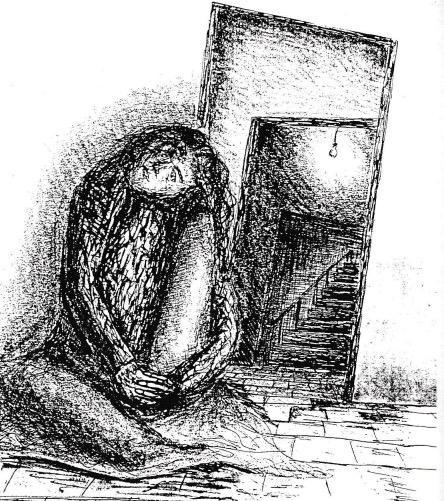
THE MAP IS VERY, VERY OLD. ON MY ISLAND IT IS NEVER COLD, I CAN SWIM AND SLIDE IN MY WARM POOL THEN DRINK SOME WATER FRESH AND COOL. THE SUN IS ALWAYS A WARM PLEASURE. ON MY ISLAND I THINK THERE IS TREASURE SHINING IVORY, SILVER OR GOLD AND MIGHT BE VERY, VERY OLD. ALLIGATORS SWIM IN THE RIVER WHENEVER I SEE THEM I START TO SHIVER. AND SNAKES SLITHER AROUND HISSING LOUDLY ON TO THE GROUND. BUT MY ISLAND IS REALLY VERY NICE. BUT BEFORE YOU COME HERE, JUST THINK TWICE.
DEBRA HOLMES, FORM IIW.
Silently moving through the reeds, Dodging a hidden stone, Swimming to fill the endless days In which he is alone.
Suddenly he darts around, Back the way he swam, For ahead he found a barrier. A rock and pebble dam.
Another fish comes from the reeds, They play among the stones, First hide then seek among the rocks, Round carpets of leaves and cones.
The new fish leaves, the time has come, He must be getting home. The other fish sadly swims away, Once again alone.
THE BARRICADED VAN TURNED, TYRES SCREECHING. THINKING OF HAPPY DAYS LONG GONE, TWO EYES STARED OUT OF THE GRATES ALONE.
RAIN STREAKED THE BARRED WINDOWS IN ONE CORNER THE ROOF OOZED LARGE DROPS AS DID THE HUGE BROWN SPHERES THAT ONCE WERE BRIMMING WITH LOVE AND NOW WERE WHIRLING POOLS OF DESPAIR.
LOVE FOR HER … HER … HER … AND OH THE AGONY OF WATCHING HER FALL INTO THE SAME MESS AND SEEING THE LOVE DIE.
LOVE FOR HIM, HE WHO HAD EASED THE PAIN BUT HAD UNDONE THE LOVE CHANGED IT TO RESENTMENT MADE THE SECURITY IMMATERIAL, FALSE. SECURITY BUILT ON NEEDLES AND MOUNTAINS IN THE SKY OF BUTTERCREAM TOPPED WITH SUGAR-ICE FAIRIES THAT MELTED AND FELL WHEN THE SUN ROSE, AND REVEALED THE NOTHINGNESS.
FACE AND FIGURES SWIRLED OVER THE POOLS FIGURES IN POLISHED NAVY. WHITE POWDERS, WHITE LIGHTS BLUE RED DEAD.
CUPPING LIFE IN TWO HANDS HE SAW ALL THAT WAS AND NEEDED TO BE AND LIFTED THE COLD BARREL WITH KINGSHAW-COURAGE TO HIS NOSE, WANTING EVERYONE (YET NO-ONE) TO KNOW HOW MUCH HIS FRIENDS HAD HURT HIM. HE FIRED.
THE VAN NO LONGER SPLAYED WATER. THINKING OF HAPPY DAYS LONG GONE, TWO EYES STARED OUT OF A JAM OF PEOPLE –POLICE AND JOURNALISTS ALIKE. RAIN STREAKED HER FACE. THE HOLE IN THE ROOF LEAKED, NOT DRIPS BUT SHEETS OF RAIN. THE EYES FOLLOWED, AND CAME TO REST. THROUGH THE HOLE IN THE SKULL THEY SAW NO EYES TWO EYES SAW NO EYES … TWO EYES FLED.
ALICE DOWNING, UVY
Teams were chosen, For the day was here, My favourite day, Throughout the year.
Ilse broke a record, The only one of the day, As she passed the finishing line, Everybody shouted, ‘Hurray’.
First was the throwing, Balls flying through the air, The high jump bar is rising, Girls jumping with care.
The relay was amazing, Horncop won all three, They all cheered and laughed, As happy as could be. Hawbarrow were the winners, The other teams did well, The cups were presented, And then it was time for the bell.
When I was young I had a dog, As black as soot was she, But then one day, she got away – she wanted to be free.
I put some dog food on the step, I hoped that she’d return. The very next day, I discovered her Cowering beneath a fern.
I approached her, carefully Surrounded by litter was she: Not litter of the rubbish kind –But puppies, all of three!
Ever since she was a tiny tot, What Flora wanted, Flora got. Give her anything, she would still want more, Screaming and kicking, prone on the floor –Until at last, her parents gave in –Just to stop the terrible din.
This happened day by day, Always getting her own way. But, one day, she went too far, She asked her mother for a car. “But dear, you are far too small.” Immediately, she started to bawl.
She screamed and stamped, all day, all night, And even tried to start a fight. But still her parents said, “No”. And of course quite rightly so.
The answer, she thought, was to run away, And she did, I’m afraid to say. She packed her bags and off she went, Away from home, away from Kent, Her poor parents went insane –As Flora was never seen again. So, if you spoil your dear little child, He or she will end up wild. And if your parents drive you up the wall –Running away won’t help at all.
Late last night I heard a call, To gather all the witches to the witches’ ball; It is held high, high on the moon. Hop on a broomstick, you’ll be there quite soon!
High on the planet, Stands a big pot, They call it a cauldron, Well, why not!
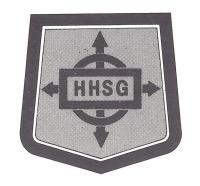
Into the cauldron, Go frogs and bats’ wings, Eyeballs and spiders, even diamond rings!
A few hours later, Not a witch in sight; They must have gone home now, Oh, what a night!
ZOE GRAYSON, LIIIMWith thanks to Charlie Groombridge for formatting this publication using InDesign, Dr Mary Munro-Hill for her invaluable proof-reading and to those former pupils who have so readily allowed their poems to be included in this publication.
Allmark, J. Anion. Anon. Anon. Anon. Anon. Arnett, R. Atkin, H. J. Atkinson, A, et al. Auton, C. M. Auton, C. M. Ayre, C. Bacon, S. C. Bailey, A. J. Balls, C. R. Barnett, C. A. Barton, S. Bates, A. Beaumont, S. K. Berkin, J. Best, J. Beynon, C. Bibby, D. M. Blackburne, J. B. Blackburne, J. B. Blackburne, J. B. Blondell, N. Brewer, A. Bridgman, M. Brown, C. Burdon, A. G. M. Capes, P. Chapman, M. R.
Chatterton, J. Cherry, D. Chorlton, H. Clark, J. Clarke, A. Clarke, C. Clubley, M. Connell-Smith, S. Connell-Smith, S. Curtis, J. Dalton, G. Desforges, K. Din, S. Din, S. Douthwaite, K. Downing, A. Downing, A. Downing, A. Drever, A. Dymond, P. B. E.M.B. Edmondson, E. M. Edwards, C. Evison, R. Fairest, J. Fewlass, J. A. B. Fewlass, J. Fewlass, L. Fish, A. Folland, J. E. Follett, S. Form I. Form IA. Forster, F.
Frank, A. Froggatt, H. Fullerton, F. M. Fullerton, F. M. Fullerton, S. Gardiner, S. Gardner, J. H. M. Goddard, K. Gordon, C. Gordon-Kerr, M. Gostelow, E. L. Gostelow, K. O. Grayson, Z. Grundy, S. Gubbins, S. C. Gubbins, S. C. Hairsine, L. A. Hairsine, L.A. Halliwell, J. C. Halliwell, J. C. Halliwell, J. Harne, C. L. Harrison, G. Harrison, S. Harrod, A. Harrop-Griffiths, K. Hawkridge, S. Hawkridge, W. Hayward, S. Heseltine, A. Hick, S. Hodgkins, J. Hodgkins, J. Hodgkins, S. Hodgkins, S.
Hogarth, S. N. Hogarth, S. N. Holmes, D. Holmes, P. Holmes, S. Holtby, T. Hornby, A. M. Hudson, B. Hudson, C. Hunter, A. Hussain, S. Iddon, H. Jackson, E. Jackson, M. A. Jackson, M. A. Jackson, M. A. Jacobs, N. Jacobs, N. Jenkin, N. Jobling, J. Jobling, J. Johnson, S. Jones, G. S. Jones, G. Jones, J. S. C. Jones, K. Jorna, B. Jorna, B. Juniper, A. Kay, A. S. Kemp, A. A. King, R. H. Kirkland, S. Lavine, S. Leak, A. Levy, L. D. Locking, F. J. Locking, F. Locking, F. MacMahon, A. E. Mallett, A. C. Mapplebeck, A. Mason, J. Mason, M. R. Mathur, C.
Merrifield, S. M. Milligan, J. Milne, C. Moody, V. E. Moses, J. Munro, M. Munro, M. Myers, A. Needham, S. Needler, S. Newgrosh, S. Newton, P. M. Nicholson, A. V. Nicholson, M. Norfolk, S. A. Norfolk, S. Oppel, J. Oxborrow, L. Oyston, H. Pallier, E. Partridge, S. B. Partridge, S. B. Passmore, N. Passmore, N. Passmore, N. Pitcher, C. Priestley, S. E. Priestley, S. Priestley, S. R.R., et al. Reid, P. Richardson, S. Richardson, S. Richardson, S. Ringrose, M. Robertson, S. Robertson, S. Robinson, H. Robinson, M. Rockley, A. K. Rodriques, E. Rose A. Rose A. Roxburgh, C. Ryder, P.
Ryder, P. Scanlan, R. Scott, M. A. E. Sharp, P. Shaw, F. Shepherd, D. A. Shepherd, E. A. Short, B. Small, J. I. Speed-Andrews, E. A. Spruit, M. Stanley, K. Strachan, J. Strachan, M. Strachan, M. Strachan, V. Timperley, A. Timperley, A. Turner, R. Vickers, F. Vickers, L. Walker, L. Walsh, V. Walters, L. Walton, C.E. Walton, S. J. Walton, S. J. Walton, S. Wardell, J. Warren, A. Webb, A. Webster, S. White, A. E. Wilkinson, C. Williamson, F. Wills, F. Wilson, H. Winetroube, N. Winetroube, N. Wood, H. J. Wood, H. Wood, T. Yagnik, R.
This publication is available to view online. However, you are welcome to purchase a copy in full colour for £16.00 plus postage. The proceeds will go to the School’s charity, the Tranby Trust.
The Tranby Trust is an independent education charity (charity no. 1079653) founded in 2000. The Trust provides financial assistance to new and existing pupils of Tranby by subsidising the cost of co-curricular and extra-curricular activities. The Trust is committed to broadening access to Tranby and holds the school motto ‘the best in everyone’ at its core.
The Trust relies solely on donations to the charity from individuals and organisations. If you or your business would like to support the Trust by purchasing this publication or making a donation, please telephone 01482 657016 or email carrie.mertens@tranby.org.uk. You can also scan the QR code below.

Tranby, Tranby Croft, Anlaby, East Yorkshire HU10 7EH TELEPHONE 01482 657016 EMAIL enquiries@tranby.org.uk www.tranby.org.uk
